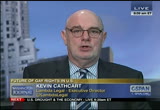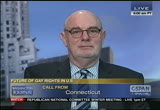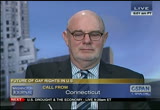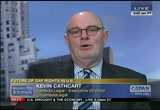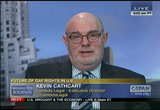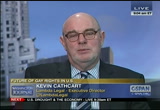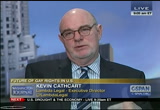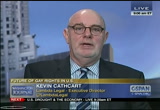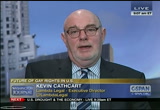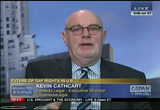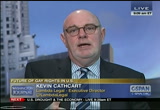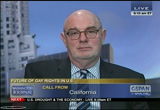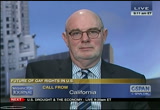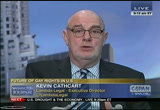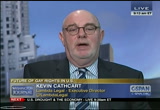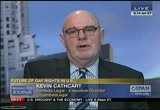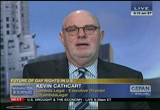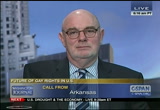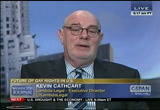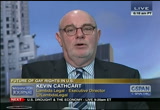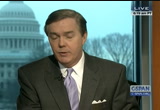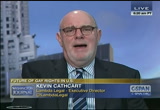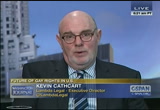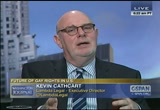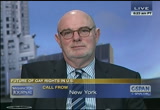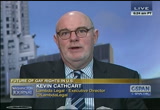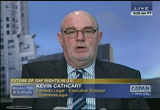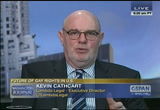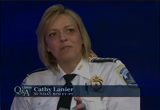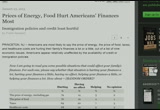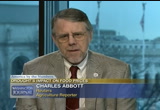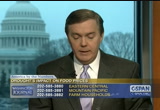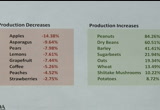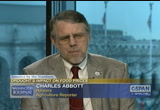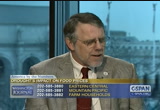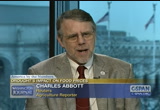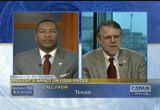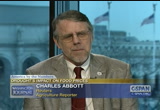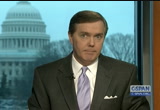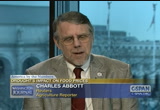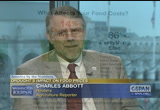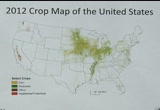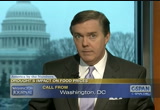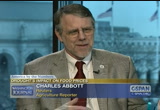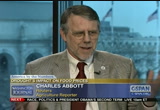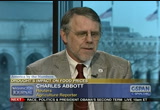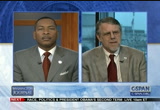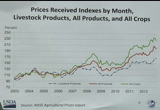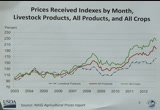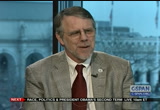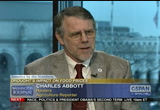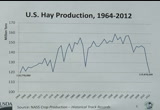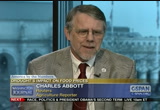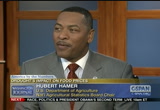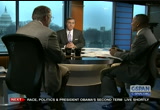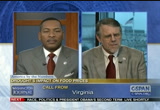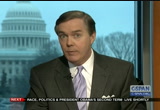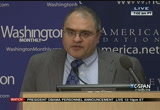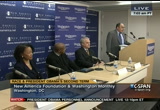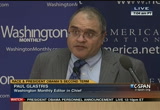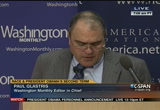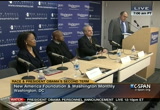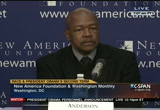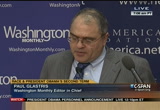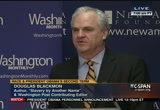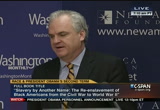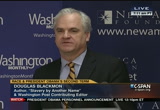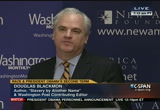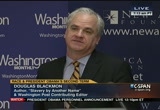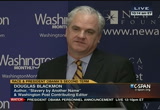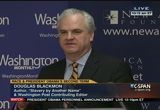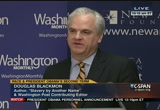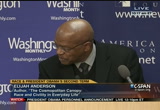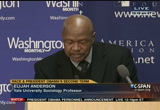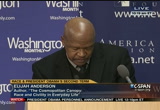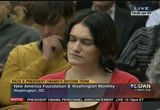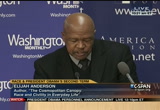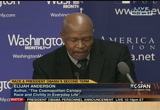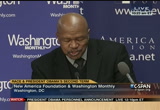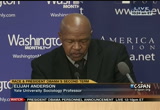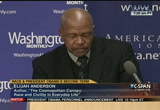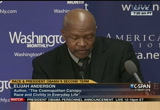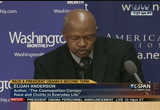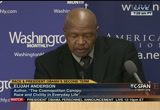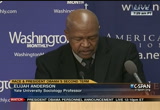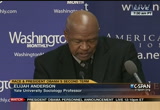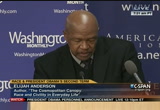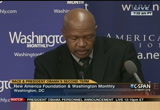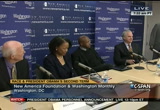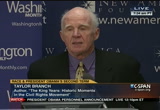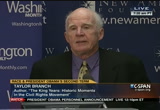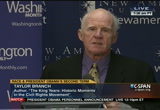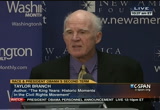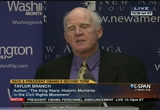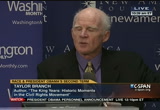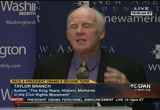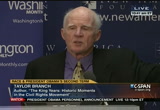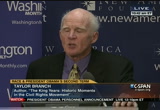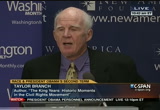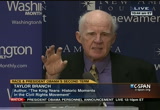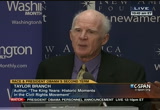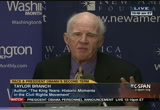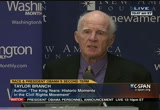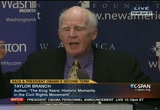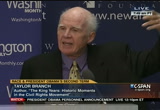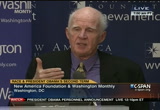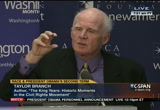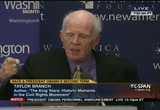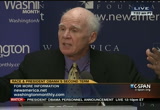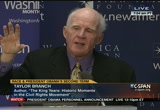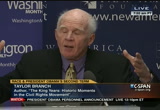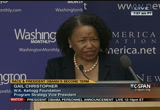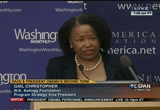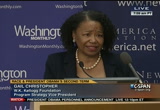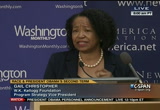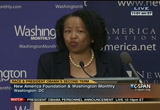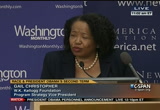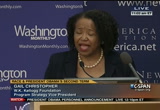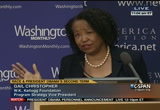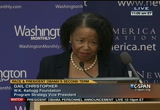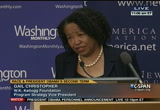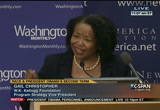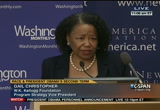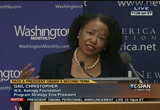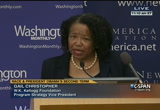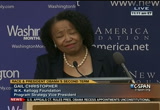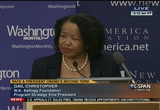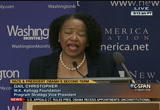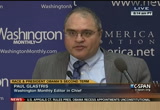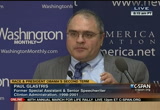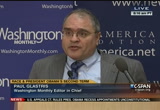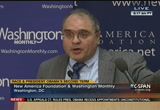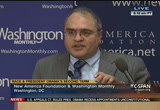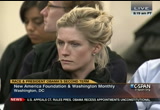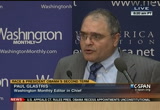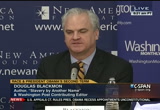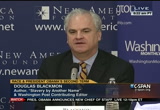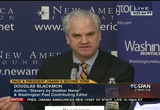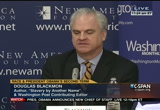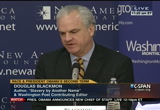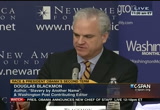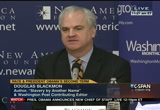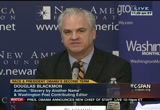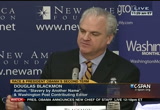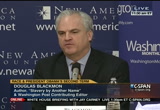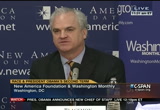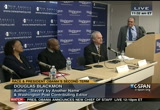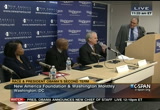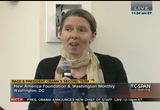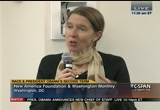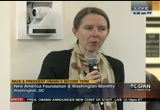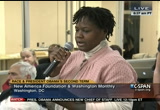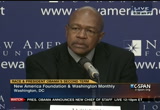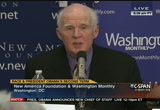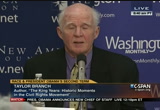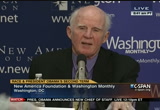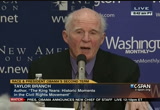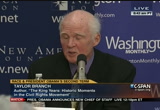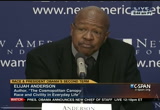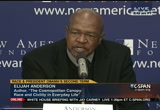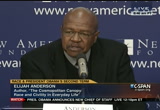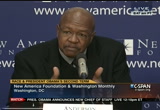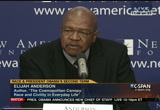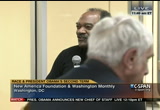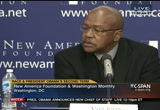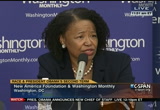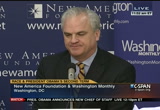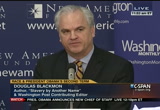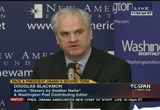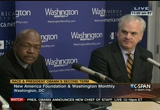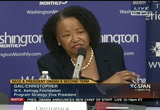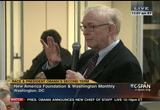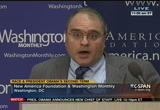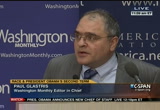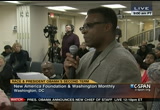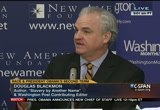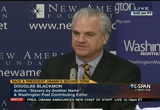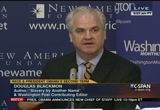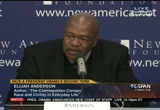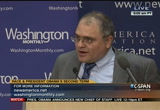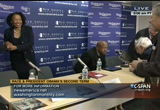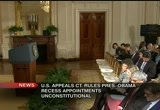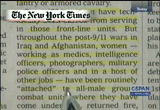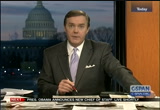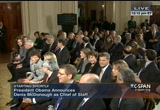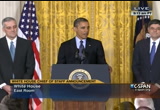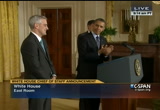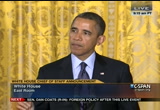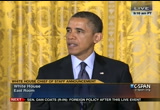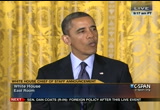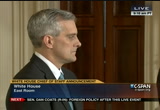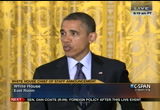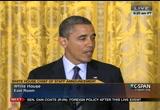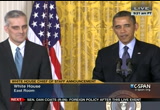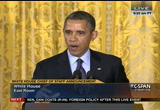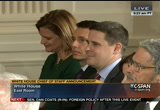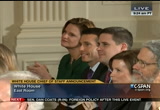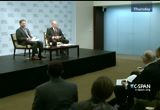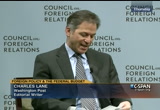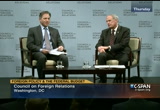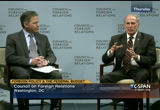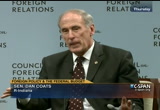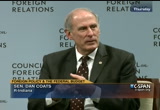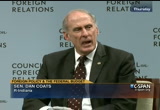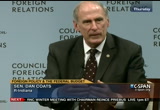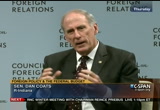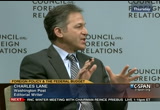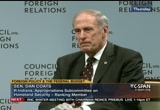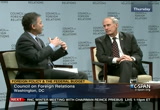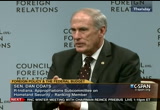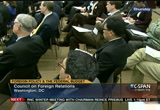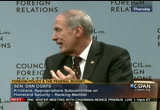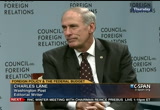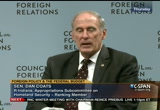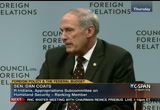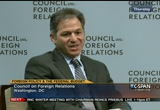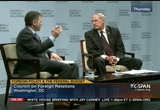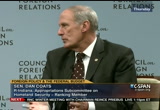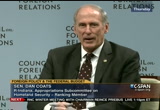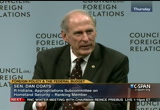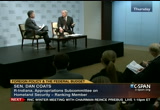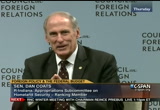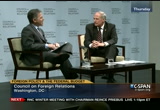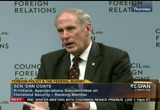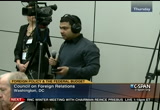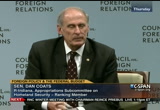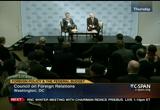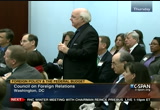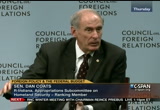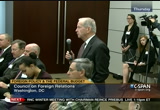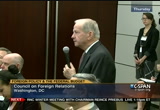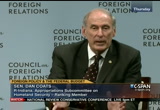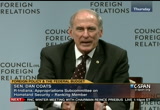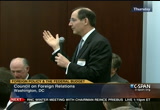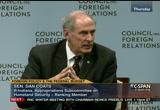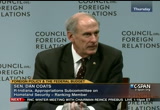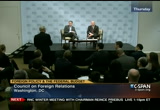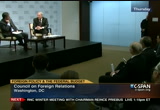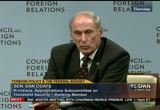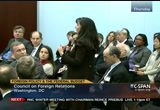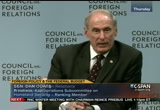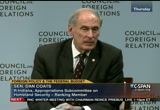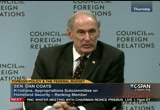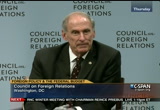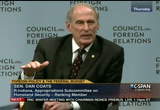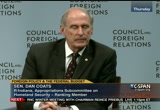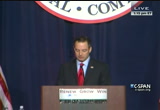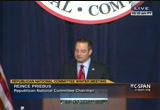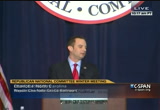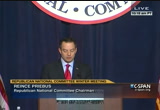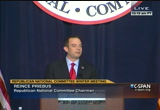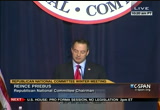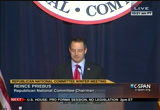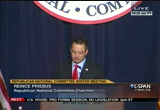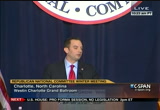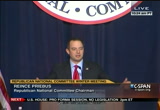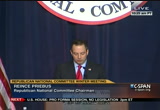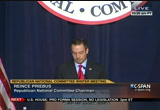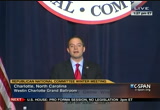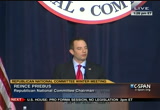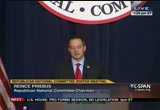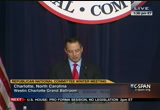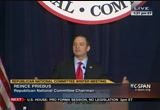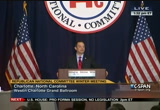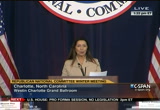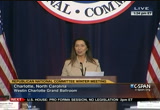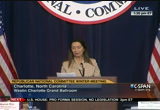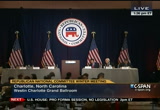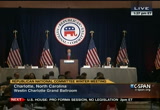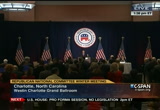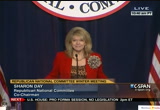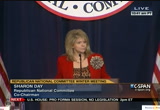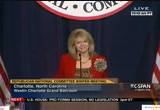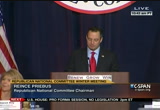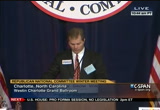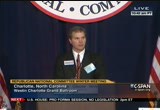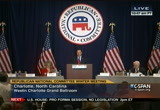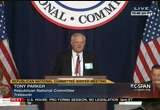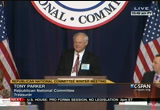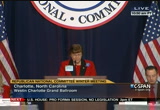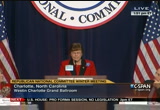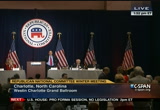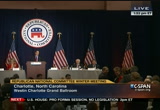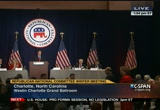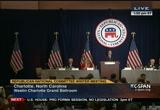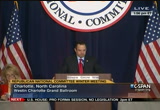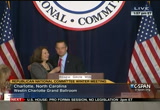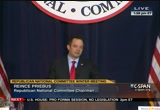tv Public Affairs CSPAN January 25, 2013 9:00am-2:00pm EST
9:00 am
turned into several days of riots in greenwich village. that is considered to be the kickoff of the modern state of our lesbian, gay, bisexual, and trans tender civil rights movement. stone wall is the stonewall is really the way this movement kicked off. host: richard, connecticut, independent line. caller: i do not understand why you don't have someone from the opposition to this gentleman on the show, because it is is somewhat controversial subject and you have one view. that is very obvious to anyone watching the show. a second point is that, internationally, people like this gentleman who have support in the united states -- in many countries against the nets is,
9:01 am
if you got now, ukraine, russia, hungary, dozens and dozens of nations are looking at the united states as an evil mention because tunnel men like this person -- gentleman like this person, " have lots of money and have more money than average americans, are going into these nations and promoting the homosexual lifestyle. in russia, they had a riot and had to shut down our professed homosexual demonstration in -- shut down a pro-homosexual demonstration because, was funded b -- was funded by american groups. and the law forbidding the adoption of russian children, a huge part of it was the homosexual lobby. russia was a communist nation, atheist, and these people take god serious now in these countries. host: richard, thanks for the
9:02 am
call and thanks for adding your voice and perspective to the conversation. kevin cathcart. guest: i hardly know where to start, but first of all, there are gay people in every country in the world, and the movement for lgbt civil rights around the world are home run in these countries. they are not steered by america and american money into it is true that there are many countries where the clashes between pro- and anti-gay politics are stronger than it is in the united states today. there are also countries in the world that are ahead of the united states, places where there is merit recognition and national civil rights laws, things we are still working towards and trimming of in this country. i don't think you can say that the united states is better than everywhere else. you certainly cannot say that the united states is worse than everywhere else.
9:03 am
there are many places for us to catch up with and if we can help other countries along the way to make life safer and better for gay people who grew up there and live there, there would be a great thing. host: this is from one of our viewers. how do you respond to that sentiment? guest: i would go back to the prior comment and said that we do have opposing points of view on this show, because i keep hearing them steadily. people are entitled to their personal opinions, but there is nothing in psychology that would back that up. if you look at the american psychological association, american psychiatric association, national association of social workers, you find no agreement with that statement whatsoever. i will not argue with somebody over something they just happen to believe. i would just say that science is not on their side.
9:04 am
host: this from jody -- to that point of view, your response. guest: finally, a comment that i like. i don't think anything the president was doing was promoting gay lifestyles. the whole concept of the promotion of thomas equality is curious, because i don't actually believe that anyone who is heterosexual is going to become homosexual because marriage laws have changed or all of a sudden there are job discrimination protections. that is not how human beings work. human beings are who they are pit in certain circumstances they need to hide hoot they are to be safe. the law does not recognize the relationship in their families. but there's nothing that will change -- there is nothing in
9:05 am
marriage equality that will change the marriage of heterosexual people. if anyone is threatened by my relationship, their marriages and a pretty bad shape to start with. host: the defense of marriage act -- oral arguments are set for march . set up what arguments the court will hear and what they will decide. guest: there are two marriage cases the court will hear prior to that over the spring. one is over the california marriage case. the california supreme court ruled that proving marriage violated the california constitution. there was a referendum, and the constitution was changed. there are 17,000 couples in california who got married during this brief period of
9:06 am
time. now they are on an island where no one else can join them. host: proposition 8, correct? guest: yes. there is also the challenge to d l oma, so-called the defense of marriage act, passed during the clinton administration to prohibit recognition of same-sex marriage. that may not seem important until you drill down and say, what does that mean? even if you are legally married in new york, iowa, washington state, maryland, or the district of columbia, the federal government does not recognize your marriage and your partner cannot get social security benefits. if you are a federal employee, your spouse will not get your pension benefits, date and will not get health insurance, your children may not get health
9:07 am
insurance. there are real life harm's every day from the defense of marriage act. we maintain that the defense of marriage act is unconstitutional. i certainly hope that the supreme court will find it so. line.miami, democrats' caller: good morning. my question to you is had you seen a lot of transgendered married with heterosexuals? what is the point of it, then? guest: well, i think transgendered people have always gotten married. some transgendered people are straight, some transgendered people are gay. the ones who are straight are allowed to marry in some places, the ones who are gay are only allowed to marry in states i mentioned already. again, i am not sure by how anyone else's marriage or life
9:08 am
is impacted in any bad way if people are allowed to make commitments to the person they glove and strengthen their family -- they love and strengthen their family illegally. host: -- legally. host: laura has this -- guest: well, i think that that is true. however, i have to say, as a longtime civil-rights activist who has watched other civil- rights movements, even the generational shift take place, the changes that we want to see don't just happen. i don't know that generational shifts just happened. i think they happen because people are out there fighting for equality and talking about it, because it becomes part of the national conversation. as younger people grow up, they grow up into a different conversation and different world. i don't think we can just wait
9:09 am
and in 20 years it will be taking care of. when the president alluded to equal pay for women -- the women's movement is in many ways much older than the gay movement. has it reached all of its goals? no. i think we need to keep pushing. however, the polls that show support among younger people are great, wonderful, and give me a lot of hope for the future. i don't know how to put a timeline on exactly when this is done. i don't know if the civil-rights movements are ever done. but with the numbers we are seeing, the support we are seeing among young people, the changes going to speed up 10 or 20 years from now. host: if you are just joining us, the issue isn't a rights in
9:10 am
the u.s. and civil unions and marriages. -- is gay rights and the u.s. and its of billions and marriages. our guest is kevin cathcart. give us the background of your organization. lambda legal is the countries oldest and largest gay-rights organization. offices in chicago, dallas, and atlanta, and we litigate around the country and to public education on lgbt and hiv-r elated rights issues. host: republican line. gloria, good morning. caller: good morning, gentlemen. thank you for taking my call to my family is six generations and the great state of california,
9:11 am
and we have seen many changes take place, especially with regard to the issues that are on your program today. i am sure you probably know that in the 1950's, the greektown of san diego -- not san diego, san francisco, passed the ordinance to protect homosexuals from being attacked. you would go to jail if you beat someone out or when after someone and cause them harm because of their sexual preference. but we've also seen in the great state of california this issue turned into a mainly a white, very well established, male- dominated issue. the men who are gay in this state are not pork, they are not an agitated, and they -- not poor, not uneducated, and they are long on opportunity. i think the issue of not allowing people to have a say
9:12 am
on what their preference is is a difficult and unpleasant hill to swallow. we've spent a lot of money on this issue, in particular aids. we have poured millions and millions and millions of dollars into this issue. we are aware that many men in this state would like to have proposition 8 overturned simply because of the financial benefits that would come to them and their partners. host: gloria, thanks for the call. kevin cathcart. guest: there is an awful lot in there and let me try to make three points. first of all, i don't think that most people who want to get married want to do so because of financial benefits. studies have shown that when people want to get married, they want to do so because of love and family and legal protections. there is definitely amiss in our society that -- a myth in our
9:13 am
society that gay people look like me. i am a white man and i am representing gay people on this show. there are lgbt people in every racial and ethnic and economic group in this country, and it is unfortunate that those faces and voices are not more visible, because that would help to convince people that this is a much broader issue. this is not a white man's issue. this is an issue that affects african americans, lesbian and gay latinos. one of the people at the inauguration was a gay latino poet. it is a myth we have to work
9:14 am
much harder to put to sleep. aids, we could do an entire other show and talk till sunset. it is a disease that hit the gay male community are, but also hit people of color very hard, particularly young african- american gay men very much at risk of hiv infection in this country today. it is tied in with the pathology that all gay people are rich, white men. studies show that they are in every demographic possible, every state in the country. staggering numbers of couples and -- sorry, the census only found couples because he did not ask individuals about their sexual orientation -- couples
9:15 am
raising children in the deep south, where many people believe we even live or go. people are living there and raising families there. they the protections, too. host: this comment from a bill on our twitter page. guest: you know, people like to talk about traditional marriage as if marriage has not changed dramatically over the centuries. people like to quote from the bible as if there were not people in the bible had multiple spouses. eric has changed and evolved as the site -- marriage has changed as a society has changed over the years. there's nothing about traditional marriage that is going to be undone by allowing lesbian and gay couples to get
9:16 am
married. we have 10 years of experience with this in massachusetts and we are building more experience building more experience in this country and countries around the world, including canada, our neighbor to the north, south africa, other places where national equality is -- marriage equality is national law. host: carlos is on the phone, independent line. caller: what you said is that marriage has evolved over the centuries, conference of marriage -- concept of marriage, and will continue to eve of, i hope. what you said earlier in the program is the reason i call it you said it dismissive when he said that no one in the religious or the church community was concerned about
9:17 am
marriage being separated from civil rights until civil rights of lgbt people started to get some traction. that is really not true. there are a great many of us. i am a lutheran pastor, and a great many of us are concerned about this issue long before glbt people got traction. host: thanks for the call. guest: ok, well, i stand corrected there. i guess what i am reacting to is the fact that i hear it more and more all the time now, and perhaps i don't know enough about the history of before, but every time there is a debate in another state about in marriage
9:18 am
law and a lawsuit in another state, we hear this issue about religion. i may be overreacting a little bit, and if so, thank you for calling in. host: ron has this tweet. let me follow up on the point that many religions still don't identify same-sex marriage as a marriage. guest: many don't, and yet, many do. if you read the papers and follow the news, many people in states that do not legally recognized marriage, many churches perform ceremonies and go through ceremonies in their faith communities. a broad range of faith.
9:19 am
it is wrong to think that religion is in one place on this. religion is all over the map on this. even within religions, there are enormous debates within a variety of sects of how to deal with same-sex couples, gay or lesbian clergy. this is a debate that is going to be going on for quite awhile but i think that the movement of history is on the side i am one. host: let me go back to one of the earlier caller is discussing adoption and the restrictions put in place. of course we know what has happened in russia, where they say no to various adoptions,. ga -- saying gay couples should not be able to adopt pit where are we on that issue?
9:20 am
guest: it varies from state to state, because marriage laws and family law issues are determined on a state-by-state business. there are places where it is very difficult for gay couples to adopt, although almost everywhere, single gay people can adopt. often they are in relationships to it this creates problems, too, because only one parent is the legal guardian of the child. there were several other responses in to the caller who talked about russia, but i have to say, i don't believe the reaction in russia to foreign adoptions is primarily or even barely at all about gay people adopting in the united states. there are highly publicized issues about failed adoptions, children who were adopted, who
9:21 am
died, about a cop who was sent back to russia. there's a lot of -- i don't know what i want to call it -- jingoism here, the issue in russian and children who need homes. but i disagree that this is about gay people and adoption and that this is motivating the debate that is going on in russia today. host: another point of view from our twitter page. guest: well, i disagree with several things there. first of all, gay citizens do not have all the right spirit that is wh -- all the rights. that is why organizations like
9:22 am
lambda legal existed and i don't think it is a disgrace. i don't want to get into one of those useless discussions about who's so rights battle is the most important -- whose civil rights battle is the most important civil-rights battle. all of these are important civil-rights issues. they were at the time, they are today. one of the things that gets lost in the discussion is the notion that these are all separate -- there is a woman's movement, a movement for racial justice, there is movement for gay people. many people fall into multiples of these movements. there are many african-american eneca and for whom synagogue stonewall are all important.
9:23 am
i think the civil rights movements, as we move forward with the work we do today -- i see this in the work that lambda legal does. many of the organization's focused on civil rights issues or race and ethnicity issues support our work and we support their work. many people understand that civil rights, there is room for everyone, and we are better off as the expense of all rights for each group, that we're not taking away. it is not a zero sum game here. host: our last call is from new york city. surely is on the phone for kevin cathcart. caller: good morning. thank you for taking my call. i just want to say that i am for marriage between a man and a woman. if gay people want to have a marriage -- i listened to my
9:24 am
president speak of mothers and teachers -- i mean, mothers and daughters, wives and whatnot. two men cannot make a child, two women cannot make a child. put in what you want of people's beliefs, but in your heart you know that this is wrong. host: thank you for the call. guest: i do not know that this is wrong because i do not think this is wrong. obviously, we have different beliefs, shirley, but i don't think the ability to have a child has ever been a test of who can get married in this country, straight or gary. allow people to get -- straight or gay. we allow people to get married when they are 85 years old, or
9:25 am
when they are in for -- infertile. many tase and lesbians -- gays and lesbians raise children, have families. we have the same interest in making sure that your children are secure under the law, and that is part of the reason why marriage to such an important issue in the lgbt movement today. host: finally, we talked about the supreme court oral arguments in march. what are the issues that justices will be considering? guest: there are so many issues at stake in each of these cases. one of the questions, the big question, is doma constitutional? there are so many ways it could
9:26 am
be done away with. we believe is unconstitutional. it also would be possible for .ongress to repeal the law this was a statute passed by congress. unfortunately, i don't see that happening in the near term, not in this house of representatives. we are hoping that the supreme court will understand the issues and will rule on the right side of history. the other issue is the california case. there are so many ways that case could go. the court could determine that proponents of repeal do not have a standing, which would leave the lower court decision in place, which would mean that marriages would come back on board in california, adding another state to our list. they could decide it is
9:27 am
unconstitutional throughout the united states to prohibit marriage equality. that is a bigger stretch, and much less likely end point. on both ofot riding these cases and so, come late june of this year, there is going to be a lot to talk about and and not going on we will now lot more about -- a lot going on and we will know a lot more about where we stand under the analysis constitution in this country. that will help us figure out our road map for the years ahead. host: kevin cathcart, thank you for being with us on a "washington journal." guest: thank you. host: scheduling information today. the associated press confirming that the president has to take his new chief of staff, denis mcdonough -- picked his new
9:28 am
chief of staff, denis mcdonough. the announcement will come from the white house at 4:00 p.m. eastern time -- 12:00 p.m. eastern time. rnc chairman reince priebus is addressing the rnc winter meeting. live coverage on c-span television. coming up next, "america by the numbers." we will look at the drought and the impact it has had on food prices. "washington journal" continues. back in a moment. >> i think it is an evolutionary
9:29 am
process. you grow into this role. my sense is that you never get comfortable if you are pushing for change and growth and not just in yourself but the issues you care about could you are never done. there is a never a time when you feel like, "there, i can do this the same way all the time." it is always changing. it changes given the issues and the state of the country, and you never know what those are going to be one day to the next. you have to be flexible and fluid and open to evolve. their first lady's -- private and public lives. c-span is teaming up with the white house historical association for a first-of-its- kind series for television. airing over two seasons. season one begins on president's day at 9:00 p.m. eastern and pacific on c-span, c-span radio, and c-span.org. >> what is the best training for
9:30 am
a policeman? >> the best training you can get to become a really good police officer and understand what it is all about -- you learn how to develop sources and you learn how to use intelligence information and learn how to leverage relationships and in the community, and that is key. people in the community trust you. they will tell you things that are happening that are not yet defined so that you can intervene and you can go about doing it. i learned the most in my career from those relationships. >> from high school dropout and single mother to the young as police chief in washington, d.c. history, cathy lanier, sunday night at 8:00 on "q&a." "washington journal continues. host: hubert hamer is with the
9:31 am
u.s. department of agriculture. and charles abbott covers the topic for reuters. the drought has a significant impact on what we pay at the pump and the grocery stores. your thoughts? guest: one of the impacts of the drought is that food prices are running at slightly higher than the usual rate. ordinarily, food prices rise at about 2% per year, using the usda's measuring system. the usda is forecasting that it will be higher than that for the coming year. you could argue that that is a relatively small impact. the other side of the equation is that food prices increasing at around three, 3.5% for the coming year.
9:32 am
the overall inflation rate is supposed to be 2%. consumers will be facing a situation that food prices will be increasing noticeably faster than other components of what they are purchasing. stores, gas stations, or when they go to the movies. host: let's put this in perspective, hubert hamer. the planning started earlier last year because the conditions were favorable. in 2011, we remember the floods and drought. we had another drought situation and december 2012. all of this impacting food prices. it was, by usda accounts, the biggest, most widespread drought since the 1950's. guest: that is exactly right. a favorable spring for planting. corn crops extremely early
9:33 am
temperatures were above normal. we check our weekly survey. around the 20th of march, we normally have 80% of the corn planted. we are at 96% of the crop planted on may 20 of this year. we also saw after the fact, in june, temperature was turned up quite a bit and started to stress the crops pretty early. host: explain the map from january of this year. this is the u.s. drought monitor. the higher the dark of the color, the higher the drought in these regions. this added detrimental effect, obviously, on the crops grown in the area.
9:34 am
the most important crop -- the 10 major producing states, we saw a 77% of the acreage, a 78% of production within this region. there is obviously a significant impact in the area. we had area southwest where vegetables and fruits are produced that were in pretty good shape as far as weather conditions. host: chuck abbott, what impact has this had on u.s. exports? guest: it has reduced exports of major commodities, the major commodities being wheat and soybeans. the united states is still the world's largest packer control exporter could -- agricultural exporter. brazil will for the first time
9:35 am
be the largest exporter of soybeans. they have long said they would catch up with the united states and find our on soybeans -- finally are on soybeans. host: the drought situation, its impact on food prices and energy prices. our two guests will be here and our phone lines are divided regionally. let's go back to some of the numbers. production decreases and apples, asparagus, coffee, increases in
9:36 am
peanuts, dry beans, barley, oats, wheat, and potatoes. guest: when you look at the crops that had significant decreases first, we had a mild winter, a late freeze behind that. that hurts the past zero crop, and asparagus, we have seen a continual decline in acreage. 9.7% decrease is acreage-base. poor pollination in washington state. grapefruit production is down 7.4%. we had high dropout rate-- high drought rates in florida. " weather affected strawberry production, primarily in california. host: chuck abbott, how does this compare to previous years?
9:37 am
guest: on the major field crops, there was a major impact. wheat farmers were lucky in that their major variety is winter wheat. they were able to harvest the crop before the drought hit. because they were encouraged to grow more wheat, they escaped the brunt of the drought. corn production was down significantly this year because weather -- the drought was at its worst during july and august. the soybean crop turned out to be almost the same as last year. some rain arrived in the corn belt in early september, and that was enough to fill out the crops. soybeans were almost as big last
9:38 am
year but not quite. but the corn crop was smallest in several years. >> almost 100% increase. why? guest: peanuts were affected by a 2011 drought. it was mostly a rebound from drought conditions. host: rob is joining us from iowa. good morning. caller: good morning, c-span. i've been watching your show, and you showed the map of the united states, how dry it is. i do a lot of traveling through minnesota, south dakota, and you cannot believe all the farmers that tile their land to draw the moisture out. maybe it is a correlation where moisture brings muster, but i would be interested to see how much tiling has gone up in the last five years.
9:39 am
i'm curious what you guys thought about that. host: either of you familiar with that? guest: is a common practice to install thailand's, which are long lines -- tile lines, which used to be ceramic, but now this porous plastic tubing, as a way of drawing mr. outer fields -- drawing moisture out of fields. heavy swells retain a lot of water. farmers want to get out some of the excess water. but when you look at the map of how large the drought area is, it is huge. the latest figures from the drought monitor, which is a federal operation, is that 40%
9:40 am
-- 40% of the contiguous united states is under moderate to extreme, extraordinary drought. to have an idea of what that compares like, a year ago the number was 27%. the drought, at its worst last year, covered 66% of the country, particularly the prime areas of the corn belt and the planes. we have a persistent drought. conditions are improving somewhat. the near-term forecast says that the drought will decrease in the eastern corn belt. but it is still a persistent problem. raising red flags for how the wheat crop will be, because that was planted in the dry crowd and moisture remains short.
9:41 am
host: what are you predicting for spring and summer? guest: we may have a difficult growing season. it depends on the weather, and farmers and statisticians at the hardest time trying to protect what the weather is. weather is a factor that we really can't predict. garland, texas. good morning, thank you for waiting. caller: good morning. thank you for c-span. i would like to ask the, what they think of my theory for the drought hit in the earth's surface, we have oil and gas, and you're taking the water out so we can sell it for $1 a
9:42 am
bottle. this is on shelves and warehouses, but not in the ground. it is part of the natural water cycle. i believe that when we take the water out and start selling it for a profit, that is how man contributed to the drought. what do you think about that theory? guest: that is an interesting theory, and i will admit it is beyond my pay scale to talk about the causes of the drought , other than a long-term weather cycles. there are records showing that the u.s. planes periodically has had multiple years or decades of dry weather, and other years where it is relatively wetter. ken burns in a documentary about
9:43 am
the dust bowl it illustrated that point, how we have weather cycles. host: let me show this viewer's point about ethanol. how has ethanol evolved over the years? guest: ethanol has evolved over the last few years. roughly 40% of corn production goes into ethanol use. corn is a valuable commodity for feed and other utilization, but ethanol is a big part of that, as well as livestock feed. host: mark in new mexico, good morning. caller: yes, my question is, it seems that the eastern part of the u.s. always floods. why can we not bring some of that flood water to the mid-
9:44 am
central of the u.s. and fill the reservoir so that we are not in address situation? -- a drought situation? host: and what about floodwater from the great lakes? guest: there are periodic discussions about using water from the great lakes. those proposals tend to have a short life, because the incredible engineering expense of that sort of project, particularly the great lakes -- the great lakes are owed jointly by the united states and canada. it would be something like a diversion into the interior united states. having said all that, there are several projects which to transport water immense distances for consumption,
9:45 am
mostly for urban consumption. host: this again from usda, as we look at the price you pay at the grocery store. what affects your food costs? 14% affected by commodity prices. 86%, everything else. guest: one of the points that can be drawn from that charge is the supermarket chart. farmers get 14 cents on the dollar, a commodity prices. commodities being cranes livestock -- grains, livestock. those prices can go up tremendously, and the effect on the consumer is buffered because so much more of the food dollar is spent on other aspects of getting the food from the farm
9:46 am
to the table. that makes a slight difference. it reduces the immediate impact, because very little of what grows in the indices is consumed directly most of it is processed in some manner. host: chuck abbott is on the agricultural beat for reuters, and hubert hamer is with the u.s. department of agriculture. another map we want to share with our audience. guest: this is the 2012 crop map, a satellite image developed by our research division. you look at the breadbasket of the united states. if you look at the green and yellow colors highlighting corn and soybean production in the midwest, basically, the most significant production region in the country along with the mississippi river in the valley area.
9:47 am
if you remember the drop on a tour map, it shows that the drought was right in that central area. if you look at the western part of the map, it highlights vegetable and fruit production, and down in the southeast and florida, we are highlighting the major citrus-producing area with corn and grapefruit production. , joining's go to ruth us from here in washington, d.c. ruth, you with us? we will try one more time for ruth in washington. caller: yes, this is ruth. i have a question about the food prices. how high will food prices as a result of the drought, how high will they go? host: general question, but how
9:48 am
high can we expect? guest: the forecast is that prices will rise about 3.5% this year. the long-term averages 3% a year, but it will rise faster than the overall inflation rates. the usda forecast for food price increases, and how much food prices increase over the year. some forecasters use month-to- month changes in prices, some have much higher or much different numbers than usda produces. fruit prices could be up 6% this year. unfortunately, when i look at that forecast, i could not find a comparison of how prices have gone up in the past. host: let me follow up on that
9:49 am
point. this is an editorial from "the washington post." "the drought that struck the u.s. last year affects about 80% of agricultural land, making it the most extensive such weather event since the 19 fifties. the increase in prices will be relatively modest, in large part a tribute to the farm sector's productivity. the vast majority of u.s. farm land is covered by crop insurance, which is heavily subsidized by the government." can you explain? guest: yes, the federally subsidized crop insurance system has become the biggest part of the safety nets. part of that is because commodity prices are so high that traditional farm subsidies are irrelevant. the government pays 67 cents of
9:50 am
every dollar on crop insurance policy. the government pays one but $6 billion a year to entrance companies -- $1.6 billion a year to interest companies to pay the costs of delivering insurance to farmers. this year, when losses for insurance policies will exceed the amount of money the companies collect in premiums, the united states government will pay a share of the losses. these are called underwriting losses. it operates under a formula that says that as losses get larger, the government's share of the losses becomes increasingly larger. the united states will pay about 3/4 of the underwriting losses. it is the amount of money that the crop insurance companies will have to pay beyond what they collected in premiums. i will back up and say that
9:51 am
insurance companies have so far paid more than $12 billion in claims on crop losses this year. that is a record. some analysts say that companies could need to obtain an additional $9 billion -- could i end up paying an additional $9 billion. host: illinois come part of the midwest breadbasket. hi, tom. caller: i recommend everybody to a search on the internet -- weather weapons and weather earthquake weapons, all these airplanes flying in the spring in the sky. host: your point? caller: chemicals. you could save a lot of money with the debt if you cut out all the expense of these airplanes flying over the united states.
9:52 am
host: ok, tom. does that impact weather conditions or productivity by the farmers? guest: probably not. that is the best answer i can give you. look at the amount of space consumed by air travel. probably a small amount. host: another chart from usda. hubert hamer, if you could explain. guest: this is the prices received by month for livestock products, all profits, and all crops. i would just divide this chart into three different areas. if you look at the left portion, you will see that the lines are fairly tight. prices were fairly stable at that time. if you move to the center of the chart, in love it more separation in the lines.
9:53 am
you will notice -- a little bit more separation in the lines. you'll learn is that our crops are moving ahead of all products. a lot of this is fueled by rising crop prices. the use of ethanol for gasoline purchases. -- purposes. if you look further to the right, you will see that the line separating a bit more. crop prices are, again, very strong. these sectors have been profitable. that is fueling the products. the bottom line, which highlights livestock products, is obviously not as profitable as crop farming. we have had a leggs in the livestock area. -- lags in the livestock area. it shows that over time, crop prices have been so strong and demand in that area has driven
9:54 am
the all products area higher. host: carl in florida. caller: doses into, i believe, a woman talking about bringing water from the great lakes. i see a much bigger problem with the coal and oil we put into the atmosphere, the carbon. the ice caps are melting, the polar caps are melting. that is of fresh water. is there not a way we can collect that water and pipe it in? host: thanks, carl. is the technology there? guest: it would be difficult -- host: is the money there, too? guest: it would be difficult to capture that for the area where
9:55 am
the water would be best used. guest: well, that is going to be one of the big questions for congress this year well, that is a little difficult to forecast what congress will be doing this year, particularly with the fiscal problems. but the livestock industry and oil industry are seeking to end the ethanol mandate. last year, bob goodlatte, a congressman from virginia and for agricultural committee chairman, introduced legislation to get rid of the ethanol mandate spirs. trade groups are concerned that there will be a bigger push this year to get rid of the mandates. several governors from livestock states and oil states this summer asked the epa to
9:56 am
administratively get rid of the ethanol mandate for the year. epa said no, just as it did a few years ago. that has not made the issue go away. host: if you look at u.s. hay production from 1964 and look at it again today, is unchanged, but a lot of changes in intervening years. guest: use see a steady decline from 1964 to the 2006, 2007 area. i would call your attention to several steady declines, looking back in 1976, 1980, 1988, and of course, this year. all of those years are drought years that have significantly inaffected productivity of hay production. we are at the lowest level since
9:57 am
1964, we have the lowest yield since 1976, and we have the lowest december hay stocks since 1967. this creates a huge problem for livestock producers. that is a primary feed source, especially in a year like this year. you also affect other users of hay. this is a significant factor in affecting livestock producers. host: worst drought in 50 years. the president talked about climate change in his address street is that a factor in what we are seeing? guest: that is probably an open question at this point. there is still questions about whether -- how that plays into
9:58 am
the naturally occurring weather cycles of, for instance, dry weather. i grew up in the midwest, the and thea dry period, 1980's had one of the worst drought since the depression. it is possible to plot cycles of dry weather and hot weather over the time. host: you also grew up on a small farm in mississippi. what do you remember? guest: i remember we were more of a general format that time, we had a lot of commodities, livestock. not nearly as much mechanical support is now. those were the growing up days. host: what can consumers expect in the year ahead? guest: again, we go back to --
9:59 am
the forecast is that food price inflation will run 315%. that is about the long-term average, which is 3%, but well above the overall inflation rate. when people go to the store, they will notice that prices seem to be a little bit higher than they used to be paid looking further down the road, prices to its the end of this year will be influenced greatly by what happens in the growing season. that will be the growing season for crops. that is difficult or impossible to predict, even to the point where farmers begin planting in large parts of the country. host: forecast from usda? guest: we will have the prospective plantings report in march, so we will get a chance to figure out what exactly the
10:00 am
intentions of some of the farmers are. i would like to say another thing about the importance of the 2012 crop year. it is out synthesis of agriculture base year, the peak time for data collection for census >> we encourage them to go to our internet website and put their information in that way. we are getting a great response on the census. the website is usda.gov. caller: i caught a piece of the conversation. north american water and power alliance?
10:01 am
guest: i am not aware of that. i spent most of the time looking at commodities. host: what causes a drought? guest: you are getting into a field that is not my expertise. i would have to do pe d furthero meteorologist. host: thank you for being with us. [captioning performed bynational captioning institute] [captions copyright nationalcable satellite corp. 2013] host: denis mcdonough has been tasked to be the next white house chief of staff to replace jack lew, who will be designated as the treasury secretary. the announcement will happen shortly afternoon eastern time. we will have live coverage on c-
10:02 am
span radio and television. your publican national committee is wrapping up its winter meeting in charlotte, north carolina. 30.will have coverage at 12:0 coming up, we will take you to a forum in washington focused on race in america sponsored by the new america foundation. it will look at race, history, and the president's second term. >> i want to thank new america for making their space here available and our partners on many things. also the kellogg foundation for making the issue and this event possible. we will be talking with a distinguished panel of writers and experts on one of the most fundamental issues in american history and politics and one that gets talked about much less
10:03 am
than it should. that is race in america. a few days ago, president barack obama put its hand on the lincoln and martin luther king bible and took the oath of office almost 150 years since the emancipation population went into effect. he talked about the country's historic and continuing march for greater freedom. we at the "washington monthly" found it appropriate to devote the subjects to the conditions of minorities in america today. president obama as measured by his november vote totals retained the support of the americans of color, neither he nor the country have talked about much of race. he mentioned race fewer times in his first two years than any democrat resident since 1961.
10:04 am
when he did talk about race, it often provoked a fierce backlash as when he said last year that if he had a son, he would look like trayvon martin, the young man who was killed tragedy in florida. tremendous backlash to that. he went silent on that issue. there has been generally a politically imposed code of silence around this residence and around the country, making it difficult for our nation to acknowledge and confront discrimination in our society. if you think such things are not exist, they member the eight hour lines at polling stations in ohio and florida this past november. it makes it hard for the
10:05 am
country to have a conversation about the realms of american life in which minorities suffer disproportionately unit over discrimination is not the driving force. nearly all americans lost significant wealth in the great depression -- and the great recession. black and hispanics lost more. modern health scourges like obesity and diabetes have hit all of america heart, but african-americans harder. our china like rates of incarceration are slowly being desperate getting to trouble the consciousness of the opinion making class. i have been a reality for the life of black families where every son or father will be behind bars according to a system--statistics. we will talk frankly about questions of race. where is america now a century and a half after lincoln signed
10:06 am
that emancipation proclamation question mark have we progressed as much as we like to think? what disparities do people of color still face? what might president obama compass in his second term to narrow these disparities? in an age of mass dollar ability, --downward mobility, policies help minorities? i urge you to take a look at wa shingotnmonthly.com. douglas blackmon is chair of the miller center for them at the university of virginia and eight correspondent at "the washington post." his book, "slavery by another
10:07 am
name: the re-enslavement of black americans from the civil war to world war ii," was awarded the pulitzer prize in 2009. his piece in the current issue of "washington monthly" is a m ust-rea. d. azure anderson is from the w.k. kellogg foundation. --elijah anderson is from the w.k. kellogg foundation. his most recent work is, "the cosmopolitan canopy: race and civility in everyday life." her anderson has served on the of thef a wreck or directors academy. he has served as a consultant to the white house, u.s. congress, the national science foundation. dr. gail christopher is vice president of program strategy for w.k. kellogg foundation and leads the american healing
10:08 am
initiative. dr. christopher was vice president of the joined senat different economic studies in washington, dc thing. she has been a guest scholar at the studies department at the brookings institution and was executive director of the institute for government innovation at harvard's john f. kennedy school of the moment. we will be joined by taylor branch, who is stuck on the amtrak train that has been delayed from baltimore. he is on his way. he is a great friend to the "washington monthly." a pull a surprise winning author -- i pulitzer prize winning author. his latest book, "the king years: historic moments in the civil rights movement" just came out. he is a conservative editor to the "washington monthly."
10:09 am
let me begin the program by inviting douglas blackmon up to the podium. doug. >> thank you. thank you very much. it is a pleasure to be here and a pleasure to be on a panel with such remarkable contributors to these conversations and so many ways about race in america. i stand in two places as a writer and scholar both in terms of in the current moment, i am an active journalist and i write about presidential politics and the things that are immediately surrounding us in american life. i write about things that happened a long time ago. it involved people who are long gone. they do shape the world we live in now. even though we are here to talk about race in america right now , some of the challenges that
10:10 am
are before us i will go back in time more in terms of this assessment this magazine took on of the emancipation proclamation 150 years later in the sense of what progress has been made in terms of african-americans. most of my historical work in my ," is "slavery by another the story of the failure of the emancipation pop nation. if you have seen the movie " limconcoln," there is an moment where after the passage of the amendment of the 13th amendment , where thaddeus stevens goes
10:11 am
back to his home and his lying beside his lover alleged african-american lover, and they read aloud the lover -- words of the 13th amendment, including the provision that says it abolishes slavery except as punishment for a crime. in those few words, that exception that exist in the 13th amendment it is through those few words that a century and a half or more of a continuation of forms of involuntary servitude, which were an overwhelmingly directed at african-americans persevered in american society. my work is primarily about how slavery continues and how it was resurrected after the civil war. and how it sustained into the
10:12 am
20th century and impacted the lives of millions of african- americans, primarily in the rural deep south where they remained into the 20th century. the reality of that history is that after a period of time after the civil war, during which the formerly enslaved african-americans of the south experience a time of authentic freedom, it's very and in its complexion and duration from one place to another, for 10 or 15 or 20 years, there was an authentic freedom and citizenship for african- americans. lies afraid hardship. poverty, deprivation of government services. when a time whe anticipation and american life and political life in the ability to establish independent
10:13 am
existences away from the white people who had previously attempted to control their lives. all of that comes to an and in a dramatic way. that is what i write about in the magazine. comes book, that period to a terrible and. freedom is literally taken away. i am not talking about dean called a bad name or people being deprived of vote or being deprived access to the court. i mean real enslavement. a new system of involuntary servitude emerged largely by this exception of the 13th amendment. as white supremacist and others reasserted control in the south, they reconfigured the criminal justice system. it was built in such a way to use the criminal justice system to force huge numbers of african-americans into hard
10:14 am
labor, which turned into the local courts and the state courts of the south selling large numbers of african- american men to commercial interests. a new kind of slavery emerged, which became important to the reconstruction of the south economic he and the revitalization of the content economy, which all of america relied on. the industrialization of many parts of the south. all of these things continued into the 20th century up to the dawn of world war ii. we do not know how many african americans found themselves back in a world of being bought and sold, but there is more evidence about this existing than many historians realize are wanted to confront. hundreds of thousands of people were bought and sold. thousands and thousands of african-american men and some african-american women died under horrifying circumstances.
10:15 am
this was a system that relied on fatality and starvation and intimidation and a more fertile kind of involuntary servitude than what preceded it. it became a weapon of terror and intimidation to force african- americans from exercising their civil rights and intimidating them into compliance with the other kinds of explicative liver that we know more about. the repercussions of all of that are still with us. the legacy of that economically and educationally is very much something we can see in the persistent disparity between whites and blacks in terms of economic achievement and educational attainment. understanding this from history that has come to an and by and large, but nonetheless, we have to understand the un-normandy of
10:16 am
what was done and that period in the early decades of the 20th century. just how much injury occurred to african-americans in the persistent of those economic damages. many people are alive today who were born into that world. many were worn in a farm in georgia or alabama or mississippi who are unaware of what was happening in their childhood where they lived. there lies were affected by this. their lives have been circumscribed. these are immediately with us. they explain about the world we live in today. for us to confront those things and move toward whatever vision of america we ascribe to is
10:17 am
almost impossible to move toward toward that effectively if we do not grapple with this element of our history that most of us to not understand very well. i should stop there. thank you. >> good morning. i was one of those people that was born in mississippi and a house on a plantation back during the war. my father and mother and family moved to the north when i was a baby. thank you for your work.
10:18 am
i am going to talk about how prejudice has changed. the tale of two black boys tray von martin and emmitt till. two young african-american boys met tragic fates that seem remarkably similar today. both walked into a small market to buy candy. linda said. the first was emmitt till, in the summer of 195520 he walked into a local grocery store in mississippi. he was later beaten brutally and
10:19 am
possibly shot by a group of white men who don't his body into a nearby river. they claimed he had stepped out of his place by flirting with a young white woman, the wife of the store's owner. the second way is trayvon mar tin late last winter when he walked into a 711 to buy skittles and iced tea. he was shot to death by a mixed race man who claimed martin had behaved suspiciously and seem out of place. the deaths of both boys got aroused the nation. the media prompted a re- examination of race relations. in the aftermath of martin's death, reporters and the public made the obvious -- martin was
10:20 am
the image tale of our time -- emmitt till of our times. liar.oys' deaths are simi these killings was also be understood as a result of their deferred strings of rachecial tensions in america. s wasacism that led tolill' born out of slavery and the jim crow codes. that racism hinges on the idea that blacks are an inferior race that deserves the poverty it gets. the premise -- the prejudice that led to martin's death is different.
10:21 am
important by those old concepts of racial orders that blacks have their place in society reflects the urban iconography of today's racial inequality, namely the black ghetto, a uniquely urban america creation. disaggregation -- this segregation coexist with a process that has produced the largest black middle class in history. reflects the social ryegrass this -- it reflects the social progress the country has made since a 1960's. it pave the way for blacks to access public and special opportunities. it would have been unimaginable in till's time. the sort of racism that led to his death so exist in american society.
10:22 am
americans have a more nuanced attitude toward the race than anything we have ever seen before. usually, that attitude is not manifest itself in violent acts. instead, it manifests and pervasive mindsets and serotypes that all black people start from the inner city ghetto and are stigmatized by their association with immorality, danger, crime, and property. in public, a perkins -- a black person's burden is a negative assumption. he must disprove it before establishing trusting relationships with others. black skin is associated with the ghetto.
10:23 am
it translates into a deficit of credibility as lack skin is conflated with lower class status. middle-class black people may be able to successfully disabuse others of their negative presumptions, lower-class blacks may not. all blacks are at risk of getting another stop and frisk from the police as well as suspicion from potential employees and shopkeepers and strangers on the street. lack professionals can usually pass inspection -- black professionals can usually pass inspection. many poor blacks cannot.
10:24 am
they have to operate in a provisional status in the workplace or fancy restaurant until they can convince others by speaking white english or by demonstrating intelligence, poise, or manners that they are to be trusted, that they are not one of those blacks from the ghetto. they deserve respect. in other words, middle-class black men waiting in line at an atm at night will be treated with a level of suspicion that a middle-class white man does not experience. this pervasive cultural association, lack skin equals the ghetto, does not come out of the blue. as a result of historical, political, and economic factors, black people have been confined to the ghetto, contained to the
10:25 am
ghetto. with housing discrimination, trucka's gutterhetotos face drove -- faced sharp troll property. it is made iconic by artists shakur, which isac intertwined with lactose. == blackness. the ghetto is a scary part of the city. it is where rap music comes from. where drugs are sold. where hoodlums rule. the ghetto is where the five people live. all black people live in the ghetto. it is that pervasive fallacy
10:26 am
that is at the root of the latest society's i perceptions f black people. it may be true that everyone who lives in a certain ghetto is black, it is untrue that everyone who is black within the ghetto. but people of all classes -- black people of all classes stigmatized by the -- i call this the iconic ghetto. the iconic hotel. it has become a powerful source of stereotype, prejudice, and discrimination. negatively defining the black person in public. the iconic yet it reflects the old version of racism that led to till's death. like person's face was in the field. in the back of the bus.
10:27 am
if he was out of his place, he was punished. in our day, a black person's laces in the ghetto. if he is found out of his face, but in a fancy hotel or golf course, in a university, or an upscale community, he can be treated with suspicion, avoided, pulled over, first, arrested, or worse. death is anrtin's example of racial stereotyping. what is known is george zimmerman, martin's killer, saw a young black man wearing a hoodie and assumed he was from the ghetto and out of place. until recently, twin lakes was a
10:28 am
safe, largely middle-class neighborhood. it has been witnessing an influx of burglaries. some have been committed by black men. zimmerman, who is of mixed race of latino, black, and white dissent, did not have a history of racism. his family claimed he had volunteered handing out leaflets at what churches protesting the assault of a black homeless man. zimmerman did not shoot and kill martin because he hates black people in general. it seems like he put a gun in his pocket and follow martin after assuming that martin's black skin and choice of dress meant he was from the ghetto. therefore, up to no good. he was taken as a threat. that is an in port distinction. zimmerman acted rationally.
10:29 am
he was motivated by a some push -- assumptions b of young black men. that does not make zimmerman's acceptable.m it makes his actions understandable in the way that ti;; totality is not. the complex racially charged drama that led to martin's death is indicative of our racial progress as a society. there have been major recent changes that do just that -- it is no longer uncommon to see but people in positions of power and privilege and prestige in board rooms, hospitals, judges chambers. we must also face the reality that poverty, unemployment, and
10:30 am
incarceration breakdown among racial lines. in this situation, the assumption of middle white americans among some progressive whites who are not traditionally racist. there are two types of blacks -- there are two types of blacks. many often feel they have to prove as quickly as possible that they belong in the latter category in order to be accepted and treated with respect. there are ghetto and non-ghetto blacks. in the distance themselves with the ghetto.
10:31 am
some blacks make cultivate an overt formal way of speaking to distance themselves from those black people from the ghetto. it is also not that simple. middle class black young people go out of their way in the other direction by adopting symbols including styles of dress or a choice of music as a means of a establishing their authenticity as still black in a largely white middle class. they want to demonstrate they have not sold out. it is a stigma and a sign of authenticity for some american blacks that the leaders many
10:32 am
middle class black parents. despite the racial progress our society has made, on the civil rights movement to the re- election of president obama, the pervasive association with black people and the ghetto betrays a persistent cultural lag. it has been two generation since .chools were desegregated if till were alive today, would remember stories of lynchings peppering the "new york times." he would remember the william man -- million -man march.
10:33 am
a black man became president of the united states. he would have been 73 had he lived. thank you. [applause] [captioning performed by national captioning institute] [captions copyright national cable satellite corp. 2013] >> we have been joined by taylor branch. i will just let you know that we have been speaking. douglas blackmon spoke. elijah anderson spoke. i would invite you to the podium and talk about the attempted second emancipation
10:34 am
proclamation. ladies and gentlemen, taylor branch. [applause] >> thank you. thanks, paul. i don't want to pay tribute to the marc commuter line. i was only on for two extra hours. i am glad to be here. i want to pay tribute to the " washington monthly." i'm happy and pleased to be with these fellow contributors to this issue. i think it is an amazing thing to concentrate a whole issue recognizing such a resin and conversions of anniversaries.
10:35 am
if you look back 1863, in many respects 1913, you had the first southerner, which wilson, elected president -- woodrow wilson who introduced segregation into the government's and maintained a general aura as a liberal and an internationalist. but he gave impetus by praising the birth of a nation for a screening in the white house, and profound missed remember men of the civil-rights era. we're 50 years after that, in january, 1963, a memoir to
10:36 am
this issue growing out of the work that i did on dr. king. it is a human story that began before the 100th anniversary of the effective date of the emancipation proclamation on his first visit to see the kennedys. dr. king was hoping to get the new frontier with all of this new energy to end segregation in housing with the stroke of a pen. he came up for his first private meeting and was dismayed to find the agenda for the meetings with the staff was all about his own staff and allegations traceable to j. edgar hoover that he had too many subversives on his
10:37 am
staff and he had to get rid of them before any kind of alliance could be discussed. this is a very complex dance, more about control than anything else. you have almost ceded control over your agenda and associates to the other party. it was a dance about control and for the kennedy administration that knew it would sacrifice a lot of its political base in the south if it took any meaningful steps against the separation that prevailed in the south and across the country. it was embedded in the constitutions of the southern states. emmett till saw a colored and
10:38 am
white-only signs. black people could not play checkers together by city ordinance in the city of birmingham. it was the key to a democratic president staying in office. the agenda about politics was first, we have to talk about getting you kosher, making sure you're not a subversive threat. witehahoots the wild-eyed radicals." they were very skillful socially by saying we like to come to the white house to meet
10:39 am
the president? he was escorted up into the residence area to of lunch with the president and jacqueline kennedy. you talked politics on the other side with the staff. this is social. they did not discuss politics in the first meeting. this was october, 1961. they were walking in the residence area down to the lincoln bedroom after lunch. king managed to get politics in it by saying, i see a copy of the emancipation proclamation. we are coming up on the 100th anniversary. lincoln proclaimed slavery to be
10:40 am
contrary and freed the slaves by executive order. couldn't you do something similar for segregation, say by executive order saying they violate the american foundation of government and therefore i declare them void. the president said it would be interesting and that he would be willing to hear more about it. dr. king went into six months of preparing a draft proclamation, executive order for president kennedy in his words to that effect. he thought it would be easier for president kennedy than passing a law, just as lincoln found it easier to issue an executive order in the midst of a war than to pass legislation
10:41 am
to do the same thing. we see how difficult it was to get the 13th amendment passed, even when there were no representatives in the house from the confederate states. dr. king thought it would be easier to do an executive order them to pass a law. this is the significant part. it would also be easier for dr. king if president kennedy could end segregation by executive order. the freedom riders after a summer of rides in which people were beaten and then went to jail simply for sitting on a bus next to something of a different race.
10:42 am
trying to protest these segregation laws. the movement of people coming out of prison. president kennedy and those freedom riders had pressured dr. king to go with them. he was not ready. he said, these students are have me now in taking risks for the movement. king thought it would be easier for president kennedy and also for king because he would not have to join the sit-in students. he loved oratory. he recognized the students were doing something necessary because as a trained corridor --
10:43 am
orator, he knew there were some things about human nature that are so stubborn that words and reasoning are not enough. you have to amplify it with sacrifice and witness. it was a dream that the movement pared having to go through what went through. he prepared this document for president kennedy and deliver to the white house in my of 1962 and never heard a word in response. by the time the anniversary of the first issuance of the proclamation, unless the seven
10:44 am
states ended the rebellion, that deadline passed and he never got any answer from president kennedy. that dismayed dr. king. then king lobbied the white house not to end segregation by executive order but on the 100th anniversary to say the senate would spend 1963 debating the meaning of the emancipation and its water mains. -- and its wider meetings. he never got any answer. dr. king refused social events at the white house that baffled his fellow civil-rights leaders
10:45 am
. he refused to go until the kennedy administration responded to his initiatives on the emancipation proclamation. all that came to no avail when the anniversary pass to and the kennedy administration did not take the fall back offer. what we outline in the article is the kennedy administration decided to honor the proclamation on lincoln's birthday in february because that would emphasize the emancipation was a republican responsibility and he invited a lot of republicans because it was with trepidation democrats approached this issue.
10:46 am
i want to make two points beyond the significance of that little story, which shows the kennedy administration more in context and dr. king more in context over how to approach this issue only 50 years ago. this is not that long ago in the great sweep of time. this month 50 years ago because president kennedy did not respond for an easy way out and also because it had taken 23,000 soldiers to get james meredith into ole miss, dr. king gave up on the notion there were be an easy way out for the country by political initiative and an easy way out for him in the sense
10:47 am
that the movement would succeed without him having to take more risks. he said we are losing our window in history if it takes all these soldiers to get one student into ole miss. almost nine years since the brown decision. we may lose our moment. he resolved to go into birmingham. go for broke. if we can do something there, we can do something anywhere. he didn't even tell his own father or his board that he was going to do wiit. he started preparing with his most trusted people, the very
10:48 am
ones that j. edgar hoover was trying to get him to get rid of. dr. king committed himself to birmingham. it was segregated by race and stratified by gender and condition of life and in every other way you might want to think. there were few female students at the university of north carolina. they had to be nursing students. there were none at yale and westceton let alone las point. in that same month 50 years ago, george wallace took office
10:49 am
in alabama with an address pledging segregation today, segregation tomorrow, segregation forever, looking at a world that was segregated by race down into the state constitution's ban had defined partisan politics in the united states such that the democratic party was the party of segregation throughout the seven states. not one single member -- no republicans. i grew up in atlanta. republicans were as scarce as polar bears. everybody else was a democrat.
10:50 am
the democrats had ended reconstruction and were the party of solidarity. since then, this movement transformed politics, transformed our world in ways that we suppressed because we have a terrible history of making any crossed racial memory comfortable to ourselves. we did it in the civil war for 100 years. we have done it for 50 years now in relation to the civil-rights movement. the liberations' set free in the past 50 years -- the word "gay "was not invented 50 years ago.
10:51 am
it referred to a crime that dare not speak its name. what dares not speak its name is the name liberal. a triumph for conservative politics and resentment against the government that made all these things possible. this little moment between kennedy and martin luther king about the emancipation proclamation should be a wake-up call to remember that we do not remember things across racial lines and that we prove ourselves that race is
10:52 am
profoundly uncomfortable for most of the dominant culture to the point that millions of white people voted for barack obama on their terms. one of their terms is that he does not talk about race. he has talked about race less than any president in the past 50 years. we're still limited and turning away from the upside of our own history. i'm hoping that this january, 1963, begin in march of anniversaries that goes forward from now. 1963 will be the 50th anniversary of the birmingham campaign, the death of medgar evers, the birmingham church bombing, the kennedy
10:53 am
assassination, the 1964 civil rights act in selma, which opened up naturalized citizenship to the whole world. lyndon johnson said when he signed it under the statue of liberty, never again will the twin barriers shatter the key to freedom. it is going to be first, and for served. we have committees all over the world. we are a pioneer democracy in evolution and in practice, and all over the world. these are profound inspiring things. i hope the next five years of
10:54 am
anniversaries will get more proper balance about the balance of politics. we should be optimistic we can tackle serious problems once again. in my view, we're still in prison by reconstruction blindness that shapes the whole landscape. we are imprisoned in language that would largely invented by the same george wallace who failed to protect segregation forever. he invented phrases of resentment and fear against the tides that were liberating america by denouncing bureaucrats in washington who were trying to tell people how to run their businesses and that they were in cahoots with a
10:55 am
biased media and to concentrate all power on the central government in washington with the tax and spend liberals. everyone of those phrases is contemporary. it is and attitude for more than a judgment that shuts us off from accurate history and from their promise of democracy. i am hoping this issue focusing on race and people's resistance to discuss race, to insist that race is salt and it is unsolvable -- is solved. they're both mean we do not need to discuss it. this issue discusses it.
10:56 am
when we do discuss it, when we learn things, that is when good things happen. that is the doorway to the promise of freedom. america is still not there yet. i hope we can take advantage of this time. we're marching through these 50- year anniversaries. bring our history back into balance and address the problems of the future with intelligence and with patriotism. thank you. [applause]
10:57 am
>> good morning. >> good morning. >> i'm so happy that amtrak or marc got itself together. it was wonderful to hear the comments that have been made so far. greeting is on behalf of the kellogg foundation. i am gail christopher. to keep the board of directors that has had the audacity and courage to say america must deal with the legacy not of race but of racism. that is an important distinction. racism is to believe, the belief system that undergirds this
10:58 am
history that we speak of. it is a believe that dates back 1700's.seven did better all manner of knowledge was being categorized from animals to trees to birds to plants, 01 not human beings -- so why not human beings? the pinnacle of that hierarchy was reflected in their own image of whiteness. and that that hierarchy descended through people of yellow pigmentation and read pigmentation and to the depths of what was called black.
10:59 am
that put in place the justification for the types of inhumane and brutal and atrocious human behavior is and the systems that formed our nation. so the work of operating that belief system, that is the work that we have yet to do. we decided that our mission, which is to ensure all children thrive, particularly the most global children, that our mission in a time of great demographic shift when in fact the majority of the children that are born in this nation are children of color, that our mission to assure they thrive
11:00 am
could not be addressed without dealing with the discomfort and the denial of the legacy and the presence of a belief system that somehow we are not one human family, that somehow our physical characteristics which are but a manifestation of the brilliance of nature to enable us to adapt to the environment in which we evolved, that somehow these characteristics determine our inate worth and value as human beings. that is the essence of racism. but that system was not cultivated into every intellectual commercial, judicial, religious philosophical medical system
11:01 am
that we have. the imbalances you see in the country today -- i call them inequities' -- are but reflections of that deep-seated belief. is it a conscious in most of us? no. in some of us, ys. -- yes. i aniston the ku klux klan -- i understand the ku klux klan was going to have a rally. some people consciously adhere to that belief. but most of us have been swept up in it and we do not even know wit. it is easy to be at the top and never have to think about it.
11:02 am
it is impossible to be on the bottom and not think about that on a daily basis and not internalize the absurdity of the devaluation of your humanity on a daily basis. my lovely daughter once said to me, "how did the story of african-americans get inverted into a story of victimization only?" "how is that story and not a story of triumph and victory? how is our story not captured and told him bodying the courage and the perseverance and the amazing qualities that are possessed by our people?"
11:03 am
and i said to her, "because we do not tell the story." there is an important thing that has happened with this washington monthly." stories are being told that are never, ever told. that 100 years between the signing of the emancipation proclamation and the civil- rights era is like one big blur. did like those 100 years not happen. and what happened to those people is seldom if ever considered. i have jettisoned the word "slave" and replace it with " enslaved human beings."
11:04 am
when you say "slave," you strip away the humanity, the human beings who were entrapped in that experience. i do not use the word "race" very often. the concept of race is a total fallacy. thank goodness for the insights of the human genome. we're all 99.9% the same. the idea there was a mental difference and if you get into the medical experimentations to justify the differences, it is unconscionable. you can even read it.
11:05 am
we all know that we are basically constituted as the same. what do we do now with four centuries of fallacy? we believe that we have to heal. and so our foundation put significant dollars -- after five years i realize it is a drop in the ocean. they put about $100 million for groups to deal with this issue. a primary focus for this work had to be the media. the meat has embraced the wallace language and has embraced much of the confusion.
11:06 am
they project a lot of that but it.n at the bnd we we're honored to help with this issue together and will it is the first of many efforts on the part of the media to have the courage to tell the stories that make us who we are as a country. we struggled. some of it is hard to think about little won't read about. it is who we are. one of the phrases we get is, " is it just about black and white?" about black and white. it is a systematic exclusion which puts white at the top and
11:07 am
everyone else beneath. we cannot thrive as a democracy without opening opportunity to everyone. somehow getting rid of the fallacy of the belief in racial hierarchy as it manifest consciously and unconsciously. some of the lessons we have learned in this country and brazil. the unconscious bias concept is the one we have to put legs on. there are hundreds of studies. if a doctor will make different prescriptions for the same decision, how you change that doctors' behavior? they are not willingly being
11:08 am
biased. they have been programmed to believe perceptions and it influences their decision. the on conscious bias -- the -- we have bias to identify the solutions. just becoming aware of unconscious bias is a step towards checking our behavior's. we have learned that communities on the ground, neighborhoods, zip codes, there is tremendous goodwill out there and that people want to do this work. and so we have learnt that putting the resources in place to support this work can bring about change and outcomes.
11:09 am
this film took resources to get it produced. there are many, many others. there are other films that we have funded. katrina brown told the story of her family. we have learned that resources are critical. but ultimately we learned this is the work of changing minds, of underwent a believe. howard from harvard reminds us of what it takes to change mind s. i will close with what those things are. we try to embody those in our funding strategy. one way to change minds is through reason.
11:10 am
we know that doesn't always work but it is important. then he talks about the importance of research. we have funded many people that are doing important research to make the case. he talks about real description -- redescription. we get these multiple points of view and are able to redescribe this history. you see it from some money points of view. then he talks about resistance. you must be able to anticipate resistance. it takes many different forms.
11:11 am
you have to be able to respond to the resistances. he talks about real-world events can make a major impact in bringing changes in mind and thinking. look what happens to the tragic deaths of the students in connecticut and then suddenly gun control is a public topics. many minds were changed on some level, on levels that people do not even understand. you have to be organized to respond to those events. many times communities are not. and then he reminds us that rewards and resources can change minds.
11:12 am
that is where philanthropy can be a partner. that is for the private sector could be a factor. the public sector could invest in this work. the incentives are there, attitudes and behaviors can shift. he talks about resonance. most of what i described appealed to the rationale aspect of our being. the residents of pills to the emotional. it is our feeling is that dictate our behaviors. there is a call for more empathy. i like to say we need more empathetic action. when people are brought together and they share their stories of
11:13 am
the experience of racism in america, it creates a residence and that resonance creates an emotional space -- it creates a resonance. understanding our collective humanity. i would ask you not to think of this work as a threat to, as so many people do. not to embrace the idea of undoing racism from a place of fear. but to agree at multiple levels that this is indeed the unfinished business of airtimes and we can and we must rise to the challenge and become one america, mature, it developed,
11:14 am
having evolved beyond the absurdity of a belief in racial hierarchy. thank you. [applause] >> thank you very much, gail. this has been fantastic. let me say one thing before we go into a discussion about this issue of "washington monthly" and the task we set for ourselves. as panel articulate, we have a gap in our understanding of our own history, a kind of flaws in our historic memory. in covering from time to time these issues, it occurred to me i do not really -- we see
11:15 am
inequities among minorities and we have our sense that they are somehow rooted in historic experience. the causal connections are hard to understand. one story we did in this issue -- we asked a great economist to answer this simple question how was it middle class african- americans have a fraction of the household wealth that white americans at the same income level have? explain that to us. he wrote a magnificent piece, looking at his own family. his father and mother sold their house to an african american moved tod tom's family
11:16 am
the suburbs. he traced both families. one 40 years later has a modest amount of wealth on which they can retire. family has very alth.e well fo percentage ofp thing, for african-americans was far greater. do african-americans not save as whietes do? no, they say at about the same rate. as white americans were riding
11:17 am
the escalator of upward mobility, thanks to a boom economy and support for home ownership and college education, african-americans were still living in a segregated world where there were largely denied all these benefits. that only change beginning in the late 1960's after the passage of civil rights and other laws and into the 1970 's. african-american is began putting their foot on the escalator in the 1960's. only then did african-americans began and it was about that time that the escalator got kind of
11:18 am
creaky. union jobs began to disappear. african-americans were buying homes in the communities that were being abandoned by everybody else. what you see is bad timing that explains this vast difference in now comes. that is the theme of this issue of the "washington monthly," so that we can understand our present situation. the other thing this issue tries to do is to look at solutions. what are some solutions to these inequities? the thing that has in recent years and explains the
11:19 am
plummeting values of african- american and hispanic wealth compared to white wealth is predatory lending in the form of payday loans and exploiting mortgages, subprime mortgages which hit african-americans far more than white. the best thing we can do to make things safer for minorities is to allow the new agency from the dodd-frank law to do its job. if we allow the government to police these damaging financial instruments, the entire country benefits because we will not
11:20 am
have a repeat of this horrible recession that wiped out everybody's wealth. thee at a moment when things we can do that would profoundly benefit minorities in this country are also beneficial to majorities in this country. that's a point i hope people take away from this issue. let me begin the questioning first among ourselves and then we'll open it to the audience. i want to begin by asking douglas blackmon -- want to hear more specifically about the phenomenon that you described in your story and in your book. tell us a story so the audience understands about this 20th century enslavement and what it
11:21 am
was like and what were the consequences? why is this still something we should know about? >> i am happy to do that. i see an interesting thread of this notion of misunderstanding and labels about our history and the over simplifications of history that we're all in documented with oftentimes out of the need to simplify our story. perhaps then by conspiracy that we must understand things. i was struck by professor anderson's cousin of these
11:22 am
definitions of prejudice and with taylor branch, i cannot tell you what a privilege and honor is to sit in the same room with taylor branch, the historian. but the optimism that you bring to this conversation. i urge my students the same idea that it is easy to feel dispirited about these things. i think it is and incredibly optimistic time, even with the difficulties that remain and the setbacks that have occurred. we're in an opportunistic moment in time. the progress has been extraordinary. my work triesthat
11:23 am
to establish that we have to reset the clock on our understanding and expectations, particularly around the achievements of african- americans. slavery did not end for african- americans. until a full century after when we think that it did and it is another 50 years almost after that before the mechanisms of opportunity are available for african-americans. 1970. the achievements in the succeeding 40 years with all the bad things that happened and with the gap that persists, the achievements are greater than any ethically identifiable group
11:24 am
of people in human history. there is tremendous achievement. what is happening to american life in the same time has often been the greatest economic expansion in human history for all the people of america. when you liberate a vital population of people within a society's population and all their talents of hard work and aspiration, they thrive and succeed and the larger society and succeeds. one of the failures of the president's message of live thinking means -- has been to
11:25 am
capture the notion that the tasks to be achieved our last today about repairing the in justices of the past and more about recognizing the greater good in the future for all americans and all humans if these remaining obstacles can be attacked. if the issues can be overcome, then everyone benefits in the society in amazing ways. that is what makes me optimistic. i tell the story of a woman who wrote a letter to teddy roosevelt's in which she describes her 14-year-old
11:26 am
brother named james robinson -- this story has been invited to bme. she writes president roosevelt that her brother has been kidnapped and sold into slavery. her story is that it is clear -- we do not know a lot about her -- it is clear that she knows exactly what has happened and she knows where her brother is. she misspelled the name of the plantation. she knows who has her brother. she has been to see the sheriff, the postmaster is probably the friendliest person she encountered in georgia on the florida state line.
11:27 am
she has probably been to the predominant landowner. she has attempted to reach out to the powerful white people in the world and she has met indifference. there has been news conference about teddy roosevelt giving a speech in which he promised a square deal for the negro. that was the initiation of these deals with been hearing about. he is promising a square deal for the negro. there has been a stir of interest among african- americans. there are a series of investigations called for by roosevelt to these allegations
11:28 am
that in a few places in the south, there are still african- americans being held as slaves. there have been allegations and she knows that her brother has been stolen and sold into slavery and no one will do anything about it. she writes a letter to the president, asking him to help. what is striking is if you stop and imagine that instant in time in 1903 where your brother has been kidnapped and was kidnapped a year ago and is in slavery. she has seen him in chains being worked with other men on a farm on a 20,000-acre plantation.
11:29 am
-- no oneitnessed th cares. to reach a moment of human desperation so great that the only thing you can think of to do is to write a letter to the president of the united states and to imagine that my accomplished some good. that was so powerful when i first found that letter. nothing happened. the letter went to the white house house-passed over to the department of justice. there was an investigation on the farm that james was being held. she misspelled the name of the farm and the name of the family.
11:30 am
this letter was filed away at the department of justice. it remains in the national archives today. there are hundreds of thousand of bottles in the naacp. there were thousands of these such cases all across the deep south. in the end, we don't know what happened to james robinson. i have not found him in the historical record. let go as thisas ev family tried to cover up what they were doing. all of those investigations failed. president roosevelt pardoned everyone. the one irresolute
11:31 am
moment in which the federal government in that moment of history, it is when the government tries to step in and and forced the emancipation proclamation, but all of the prosecution failed. barbara prosecutors concluded that the fundamental problem, and this is hard to comprehend, but they realized slavery is not, in fact, a crime. it was unconstitutional that no federal statute had ever been passed to make the holding of slaves a crime. they had no statute on which to bring forward these prosecutions. white slaveholders would go into the court and admit to these facts. there would be charged with
11:32 am
debt slavery, which was a crime. he did not owe money. i was not holding them to pay off debt. i just bought him. he is a slave. i'm innocent. the result was the department of justice concluded there was no way to prosecute so no reason to investigate. the federal government had a policy of not investigati anding instances of slavery and they are consistent of that until 1942. -- the federal government had a policy of not investigating instances of slavery. my family were dirt-poor white people in the rural south. my family makes a steady progression long before the 50's
11:33 am
and the 60's and has the capacity to obtain small amounts of land, then a little more, benefit from all of these. my family did not have running water until the 1950's, but these are all done in a way in a way that african-americans are deliberately excluded from. it is the resetting of the clocks, the march toward the middle class and that is something that we must understand to challenge the issue there remain in the present. >> i think is a fabulous story and i would invite anyone on the panel to respond. in that case, we have plenty of time left over for some
11:34 am
questions from the audience. in the back is a microphone. please raise your hand. wait until the microphone comes to you. state your name and affiliation if you have one. we will start here. >> my name is katrina brown. he referenced a documentary i produced about a slave trading family from rhode island. speaking from that context of knowing the family history and the extent of the northern complicity in slavery and racism, i want to take up your call an invitation for us to build on these anniversaries. i'm not a poker player, but i want to see and raise. the idea that we are at this and
11:35 am
reception at the incredible anniversary, starting this year with the march on washington and the "i have a dream" speech and it coincides with the 150th anniversary of the emancipation proclamation. five score ago, a man side of this and yet 100 years later we are still not free. we cannot get civil war and civil rights at the same time. we will soon be upon the 150th anniversary of gettysburg and the gettysburg address. and allows for a conversation that is missing. not just about the black-white unfinished business but also the white-north and the white- south unfinished business. we white northerners have
11:36 am
assigned all blame and responsibility to the south when we were very, very heavily complicity in slavery and racism. once you start looking through that lens, you can see the history of the civil war. the fact? lincoln has such a hard time passing the 13th amendment when the southerners worked in congress at the time points that out right there. to have a conversation where we're looking at what that does for the politics of how white southerners and southern conservatives in particular, looking at the history of the civil war and civil rights, you feel like white northern liberals are telling them what to do. that was just acknowledgement of that conversation. we are starting to pair up with religious denominations, the united methodist church and others, to invite that
11:37 am
conversation over the next three-five years and we would love to talk with anyone who would look to bring that forward to the public in the spirit of this panel. thank you. >> this lady right here. >> amanda jackson. i have two questions. the first i will direct towards you, dr. branch. your comments about race in this presidency and how america, particularly wide american art, will allow for the discussion of race on their terms. i'm wondering if you could talk more about that. one example that came to my mind, first, was during the height of the professor gates situation when the president initially responded to say the cambridge police acted stupidly.
11:38 am
he backtracked on those comments. i just wonder if the president himself did not create boundaries in talking about race without being his initial reaction during the first year of his presidency that presented a very real opportunity to talk about race when he backed away with it -- from it. dr. anderson, who made a comment about the ghettos in arab- american of -- in urban american a and black on black crime. you did not say that the the plea, but i feel like when we talk about crime in this country as it relates to minorities, there is always a focus on african-american. and black on black crime has
11:39 am
been coined. crime, ingeneral, happens in inter-ethnic groups. how do we shift from the black on black crime as opposed to americans commiting crimes? how do we shift away and recognize that it is not just black on black when we talk about international crime -- inter-ethnic crime? respo ofnd to your question asked toomey -- i will respond to your question. we have very raw, instructed the history but we all perceive it unconsciously through different lenses and that is what we have
11:40 am
to work on. the president, a guarantee year, there are hundreds of people who dread any moment the president mention the race. he said if he had a song that he would love like trayvon martin and all hell broke loose. is we haveying different perceptions that have been filtered through race. the president made a judgment that he is better served to try to lift all boats and not discuss. anything more explicit is dangerous. i'm the same, that's sad. i don't second-guess whether he should change his behavior. i just say we should change our behavior. if you listen to the "i have a dream" speech, it ends "all
11:41 am
americans, will be able to hold hands and sing and in the words of the old negro spiritual, free at last, free at last. when you think about it, he is inviting non-black americans into the spirituals to join that culture. the way the march on washington is interpreted them, and ever since, the next day and on the cover of white magazines, it is pictures of black people behaving like white people, therefore they are not threatening. even though he was inviting, it was perceived as, those people were really nice. the press for gave him for being a bastard, sexual, draft dodging, ex-communist because they took the egg off their face
11:42 am
and they thought it was going to be a disaster. they said, in effect, all crimes are forgiven because he put porta-potti is over the mall and make these scary negro's nice enough. that is what it is. we have to work to change the lender -- the lines of history. dr. king as a model of history because you hear in his voice before you even understand the words that he has a realism that is at war with his optimism about principles. there is like a furnace in his voice and that is what is really captivating. in order for us to get to that place, we have to step outside of our comfort zone. that is what i had tried to get in one small practical thing. to me, it is about that. i'm always reminded of diane of nashua told me her rendering metaphor for the movement was her wedding day because her knees were shaking and she knew
11:43 am
she was taking a big leap that was self defining. she said she felt that way in the movement every day of because she was reaching out to people from risking things cameras. going to jail interesting things that were fundamental. that is basically what the movement was about. that is what we ought to do. we ought to talk to people across these lines. if we can get comfortable being uncomfortable, that is where the rewards lie as far as discovery. having said that, i also want to apologize because i'm trying to catch up with my schedule to the train and i will have to leave in the next two or three minutes. i have really enjoyed this. again i want to pay tribute to the monthly for having this issue and thank you for including me. thank you to my fellow panelists. [applause] >> can you hear me?
11:44 am
i would like to respond to your question as well. i. large number of americans like to think we are in a post-racial america. i think in many ways we have made a lot of progress. i have written a book which emphasizes the spaces in cities where people can all come out and get together like this island of civility in a sea of segregation i also write about the iconic get no and the icon at get no is this notion of the ghetto that a lot of people have in america. yes, we have made a lot of tremendous progress, but the ghetto has become as powerful icon in american society and
11:45 am
culture. it is also a very important source of stereotype. this is very powerful. first of all, black skin color deals with these contradictions that limit the status. the person may be doing very well, class why is -- class- wise, but his anti associates him with the get go. the ghetto today-- associate him with the ghetto. massive unemployment. people are desperate. people are getting shot and killed. "the wire" comes to mind. we are moving through one of the most important, i think,
11:46 am
changes since the industrial revolution. we have moved from a manufacturer to service, the context of an increasingly global economy. great numbers of people living in these poor communities, not just poor black communities but poor whites as well without the capital, the human capital, to really make adjustments to these changes, you know? it has the black population very hard. people who cannot adjust to this situation often go to the underground economy, and drug dealing, hustling, of and what is left, but a great number of people are in exchange things just to make a living, just to live. a lot of this is done without the benefit of civil law.
11:47 am
there's a lot of back-and-forth, attention. the have abdicated their responsibility to these communities in many ways especially with respect to what enforcement. the civil law in many of these communities has eroded. civil law is weak. i for an eye, tooth for a tooth. most people in the community are decent people, but they're living under pressure in these communities. in order to survive, you have to have street credibility. it is very difficult to obtain, by doing these, being tough, being responsible for your arms safety and security. this means all of these transactions going on are going on without the benefit of civil law.
11:48 am
people argue and fight, tensions, issues, whatever. we're talking about a very high rate of violence it in the inner-city poor community. this is not something that is natural. there is something to structural about it as i have suggested and written about. the ghetto that we see today, the black ghetto community is very special in terms of not being comparable to many other circumstances bring you have the other ethnic groups that you talked about. anyway, i think it is complicated, but in community after community, philadelphia in particular, we have one of the highest murder rates in the country. in chicago right now, in certain ghetto communities, the
11:49 am
violence rate is so high and people are getting killed left and right. this is not me making something up. this is document double. that has to be attended to. it has to be dealt with. i could go on, but i won't. i will just respond to your commentary. >> a question from the back. >> sought i'm sorry to see taylor leave, but i just wanted to and knowledge. i'm the director of the media policy initiative here of the new america foundation and i wanted to applaud "the washington monthly" were this issue. it's an excellent piece of work. my comments and questions, given my title, will not surprise you. recognizing the importance of media in establishing a crutch. dr. king recognize the importance of medium in urging
11:50 am
dr. parker to investigate televisions in the south. the kerner commission recognize the media as one of the reasons for the riots in the 1960's. media was talked around in this report but i did not see a report about are very segregated media here in the united states and i was wondering if you could comment about that. speaking to dr. anderson's notion about structural problems, we may have some structural problems in the medium and how it relates to raise, how raises related and the problems with reason, research, and resonance. thank you. >> do you want to speak to that one? >> there is a certain amount of time and so many pages to fill for this particular issue.
11:51 am
certainly in designing the approach to this work up the foundation of, we have a strong emphasis on the media. we started out by funding an assessment from the standpoint of the demographics and racial imbalances. we have funded institutes and others to work our unchanging that. talk radio is probably the worst in this area. when it is dominated not only by people of one racial background but from one ideology almost, one political perspective, you end up perpetuating the same myth. the structural dynamics in the media are critical and we have done a lot of work with the various associations in the media. we have held workshops so they can understand better and workers -- reporters understand unconscious bias of they learn how to reclaim a story to show
11:52 am
multiple perspectives. within npr, there is a shift, there is more diverse perspectives, if you will, then you saw five years ago. we are not where we need to be, but you nailed the critical piece particularly now with technology. we have to really focus on that area. >> i would like to quickly add wanting to that. it underscores the importance in the absence of diversity and i so much of the media. it _ so many of what this group does in terms of funding instruments of the media and then still letting it operate very independently. -- it underscores so much of what this group does. having worked at both "the wall street journal" and "the washington post," it is vital.
11:53 am
another part of that media would not have happened without that underwriting and philanthropic support. it stuns me how little this topic is discussed today. five or 10 years ago there was a tremendous discussion about the lack of diversity in the u.s. media and ever major nation had very sincere missions under way to try and better diversify their stock. the wall street journal, the news pages, they were deeply committed to trying to do the more debacle task of trying to diversify the stop there. and that was the initial story that led to my book again led to
11:54 am
the film that began with an article there. it was a place that was very open to contrarian and an unexpected examination of corporate conduct as a related to things like race. all that has largely gone away. in all of the discussion about diversity in the medium and the need to undertake initiatives, particularly with the economic collapse and the declining business models of these organizations, it turns out that was completely luxury of profitable time. it's all gone. the diversity director people are all gone. when i left "the wall street journal" one year ago, this is not intentional, but i do not believe there had been an african-american reporter or editor of any particular stature in the organization. i do not think there had been a black person hired at "the wall street journal" in the previous
11:55 am
four years. this places was traveling with the diversity issue and it has gotten worse. what stuns me is i may have just made the first public observation of that fact that has never been made. the associations and such have stopped raising the human cry. the point made in his piece, one of the points was that we had this incorporation process that was a result of international pressures to some extent, to make america whole and make america look better. we had this incorporation process but the pressure for that has waned. >> the only thing i would like to add is it is a conundrum that we face. i was particularly struck in response to the question about black on black crime versus an inter-ethnic crime.
11:56 am
the more we reiterate the disparity is, the more it seems to feed the need to hold on to the perceptions and stereotypes. york caught in trying to raise awareness of the issues but also being -- you are caught in trying to raise awareness but also being cautious in terms of the impact it will have on your listeners. while we live that the disparities in the media or the disparities in the professions or crime, because we have not addressed the fundamental backdrop of bias that predominates, people take out and find a place to put it in their head saying they are inferior. that's why it exists. they are to be feared and that is why there is crime in the ghetto. we have to figure out how we both address the issues but also have the sophistication to
11:57 am
make sure we are not feeding the monster of the bias that exists. i just wanted to say that because i could hear people listening to what's is being said and i imagine the brands are going, yes, that's what we know. be afraid. it is difficult, as taylor said so well, it is complex, but we can do it better and we can overcome this legacy. >> we have time for maybe one or two very brief questions. maybe up front here? >> i'm from "the washington post" riders' group. i have a writing for years about the racial overlay in crime groups. i'm wondering where action might come. there was a proposal from senator webb for a commission on
11:58 am
criminal justice who would look into the system and the deep racial implications in the way it was carried out. it passed the house but it failed when one republican senator got up and objected. it could be done by executive order, perhaps not as well, but i wonder if that is the way we could begin to see some more debate on the real indication that are both in the criminal- justice system and its racial implications. what a presidential willingness to move on this could represent. >> this gives me a chance to brag about two stories in which we addressed exactly that. one is by the eminent scholars on how it is regard to a position where huge numbers of african-americans are cycling through our system of prisons.
11:59 am
if each one of those cases were rightly tried, and that is a big assumption, we would still be morally reprehensible. and there is a piece by mark k limon on how we could reduce those numbers with clever and proven methods of parole and probation reform were people simply -- i will not go through it, but i will suggest that the u.s. some of our readers read this on washington -- you and some of our readers read this on thly.com.nmonrt >> i'm just a private citizen. this is directed to the book, "slavery by another name."
12:00 pm
relating to the disparities in incarceration. they have written and powerfully about the industrial complex and its prisons are built in rural communities. they are being fueled by black and brown bodies. one community is being depleted and another enhanced. michelle alexander writes about these individuals being branded for life. while they are incarcerated, they are counted for census ison.ses and those regionprsion
12:01 pm
can you speak to that? >> that is an important question with a complex answer. i do not have all of the answers. i know more about how badly things went in the past and in the present. i have taken interest in the issue of the reliability of the criminal justice system and its convictions. i have become convinced in addition to some of the basic observational problems of mass incarceration of african american men, it is a blight and cancer upon our society. something is wrong. even if all of the convictions were valid, which we know is not the case in substantial numbers, something terrible is happening
12:02 pm
there and something we continue to want to close our eyes to. i have become convinced. there is a lot of growing empirical evidence the unreliability of convictions. it will be the issue that 50 years from now when we look back on this time and we say to ourselves and our children, how could they have ignored that? how could that not have been so obvious to them that all of these people were going to prison who had not done the things they were accused of. all of these people were punished in disproportionate ways, that will be the observation made on our time. as we go into -- we have to be honest. part of the message here today has been break out of these standard positions and standard conventional views from the left to the right or what color
12:03 pm
you consider yourself and wrestle with the difficult honesty of this. what are the -- one of those issues is that african- americans and distressed neighborhoods for a long time were incredibly supportive of harsh measures to try to bring safety and security. that has been an element, too. americans wanted this stuff response when there were much higher crime levels across the country. crime levels are falling, and we are saying, where all the black men? we are distressed about it. we wanted it. it is not as simple as that some mysterious distance power made this happen. me made it happen -- we made it happen. we have an obligation to get honest about that and to reckon with the consequences of our needs for security and another time. >> i observed the people.
12:04 pm
one of the points of this book is that for many black people living in these communities, there are two different systems of law -- one for white people and one for black people. the wider system with respect to the police have advocated their committed -- abdicated their responsibility to the communities, so people are on their own. the code of this treat prevails. the sense is that the crime in the black community will not be investigated. you can call the police. they may not come. they may come late. you are on your own. this encourages the street justice mentality within the community. it is very important to
12:05 pm
consider. >> gail, final thoughts. >> this is a wonderful day. it is a wonderful publication. we hope that it marks the beginning of an ongoing willingness to address the issue that is a part of the definition of our country. both its past, present, and future. i thank you all for showing your interest in being here. i applaud the "washington monthly," and you as a wonderful editor for having pull together something that is unprecedented. >> thank you. >i want to thank gail and the folks at kellogg for partnering with us. we stretch ourselves to think of some things beyond what we had
12:06 pm
12:07 pm
>> if you missed this event, you can find it later in our video library at c-span.org. will take you live to the white house. barack obama will choose his trusted advisor, denis mcdonough, as his fifth chief of staff. that is expected in a couple of minutes at 12:10 eastern. we will have live coverage. the white house getting some not so good news from a federal appears court. the president violated the constitution when he bypassed the senate to fill vacancy on a label relation sh -- labor relations poweabnboard.
12:08 pm
to run for aor secto third term. he said -- this is about frustration and a lack of leadership from the white house and at the dearth of meaningful action from the congress, especially on issues that are the foundation of our nation's economic health. saxby chambliss will not seek a third term in 2014. in washington, it is the 40th anniversary this week of the roe v wade decision that legalized abortion. a live look on the national mall. the 40th march for life is on the way. among the speakers, former republican republi and it rick santorum -- candidate rick santorum, .
12:09 pm
12:10 pm
wilson, little rock, arkansas. caller: that is one of the most ridiculous things. even though women are just as brave, it is no doubt about it every year he their physical ability and their stamina i am an ex-paratrooper from the military. training for women has gotten easier. women can be distracting for men as well. host: the orders to end combat exclusion, seeing that it will level the playing field in
12:11 pm
careers. brian on the republican line from wisconsin. welcome to the program. caller: glad i got a hold of you. first time on the program. i am 71 years old. i believe that women are capable of going into the military and serving in combat. also, i think we will have a lot of problems. i do not believe that men and women should serve together. there are different jokes, different things that go on. i think there'll be a lot of problems there. host: thank you. from inside the "washington times" -- >> we will take you lik
12:12 pm
to the white house. president obama and a couple of minutes will announce his national security aide denis mcdonough will become his fifth chief of staff. he has advised the president on foreign policy for nearly a decade, serving as the president of beauty national security advisor. -- deputy national security advisor. >> ladies and gentlemen, the president of the united states
12:13 pm
accompanied by esther jacob lew and mr. denis mcdonough. >> thank you. thank you, everybody. please, everybody, have a seat. good afternoon, everybody. welcome to the announcement of one of the worst kept secrets in washington. as president, i rely on a team of men and women here at the white house every day. i rely on my chief of staff to keep up with them and our entire government. making sure we are moving in the same direction. making sure that my priorities are being carried out in our policies are consistent with the commitments i have made to the american people and we are delivering progress to the american people. i could not be more grateful to
12:14 pm
jack lew for his amazing service first as our omb, then at the state department, and ultimately as my chief of staff. as he prepares for his confirmation hearings and the challenge of meeting our treasury department, i am pleased to announce my next chief of staff and a great friend to me and everybody who works are at the white house, mr. denis mcdonough. i have been counting on him for nearly a decade.
12:15 pm
since i first came to washington, when he helped set up my senate office along with pete rose, he was able to show me where the restrooms were, how you passed a bill. even then, denis had gray hair. i have been trying to catch up to him. at that time, i relied on his intellect and his good judgment, and that has continued ever since. he has been one of my closest and most trusted advisers on my presidential campaign, on my transition team. he has been an indefensible -- and dispensable member of my security team as well. he has played a key role in every national security decision in my presidency. our response to natural disasters around the world to
12:16 pm
the repeal of don't ask them tell -- dont t'tel tell. i have begun to think that denis likes pulling all minor nighters. the out works denis mcdonough. art of the reason you saw such words of applause -- warmth of applause is because he is such a humble guy. he is still just the dude from stillwater, minnesota. given his humility, i do not think people always appreciate the breath of his experience and range of his talents. it is because of that intellect, that experience, his dedication, his determination that i wanted him in this job. as a veteran of capitol hill will he was mentored, he understands the understood --
12:17 pm
the importance of reaching across the aisle to deliver results for american people. denis is respected by leaders across our government. at it all up. he has spent most of the past watchful years leading interagency meetings, hearing people out, listening to them, forging consensus, and making sure policies are implemented and everyone is held accountable. he always holds himself accountable first. it is no easy task. he does it with class and integrity and thoughtfulness for other people's point of view. he is a consummate public servant. he plays it straight. he has the kind of team mark i want any task that is the kind of teamwork i want in the white house. i have wanted him to help in our outreach to the american people as well. he is a man of deep faith.
12:18 pm
he understands that in the end, our policies are measured in the differences they make in the lives of our fellow human beings and the values we advance of americans. he insist on knowing for himself the real world impact of the decisions we make. away from the cameras, he has visited our troops in iraq and afghanistan repeatedly during their concerns, finding out what they need, and making sure to follow-up. he travels to walter reed to spend time with our wounded warriors. then, he comes back to the white house and he gets it done. that is the kind of focus and the kind of heart that i want in this white house. do not get me wrong, he can be tough. it probably comes from one of 11 children. you have to be tough.
12:19 pm
two of his sisters are here, mary and anna. they are just beaming. they could not be more proud of their brother. maybe it comes from his college football days as defensive back under the legendary john clardy -- gallardi. these him that he made up for modest talents with extra nara dedication --extraordinary dedication and a high pressure for pain. this reminds me of the one topic on which we will never agree and that is vikings versus bears. there is another reason we all love him and that is for his decency and respect for those around him. ask any of the staff who are here today, and they will tell you despite the unbelievable pressures of service at this level, denis is still the first
12:20 pm
to think about a colleague or write a hand written notes to say thank you or ask about your family. that is the spirit i want in this white house. this is reflected in his incredible love for his own family. i know that that has been at work a lot. during the week and on weekends. but, i guarantee you he would much rather be with you than with me. the next job that he will have will be demanding, too. the one reason he does this is because he wants to make sure this world is a better place for all of you. that will stop riding his bike to work. as chief of staff, i do not think that is allowed. he does what he does because he cares and loves you guys so much and wants to make sure the
12:21 pm
next generation is inheriting the kind of america we all want . so, i am grateful to the entire mcdonough family for putting up with us. you are one of my closest advisers. i cannot imagine the white house without you. thank you for signing up for this very, very difficult job as jack lew will testify. i know you will always give it to me straight. as only a friend can. tell me not only what i want to hear but what i need to hear to make the best possible decisions on behalf of americans. for me, -- from me, thank you for taking this assignment. congratulations. >> thank you.
12:22 pm
i have one other thing to add. we made a number of personnel announcements today. there will be an incredible team that denis will help lead. i thought i would take the occasion to embarrass somebody. some of you may know that today to stay inuouffe's the white house. i had to hide this at the end of my remarks because i knew he would not want me to bring it up. we had some secret squirrel stuff going on to avoid him thinking that we would talk about him.
12:23 pm
as many of you know, david has been with me from the very start of this enterprise. , running for president. i cannot tell you how lucky i have been to have him manage our campaign back in 2008 then join the white house during these challenging last two years. he has built a well-deserved reputation of being a numbers genius and a pretty tough combatant when it comes to politics. but people do not always realize -- what people do not always realize is the reason he does the stuff is because he cares deeply about people and he cares about justice and making sure everyone gets a shot in life. those values have motivated him
12:24 pm
12:25 pm
>> president obama naming denis mcdonough as his next chief of staff, replacing jack lew, who has been nominated to be treasury secretary, his hearing to come on capitol hill. you will find this event and our video library. we will take you to the republican national committee winter meeting. they are choosing their leadership. chairman reince preibus is expected to be reelected. we will pick up our coverage at 1:00 pm eastern. today, the national march for life, the 40th annual. on your screen is congresswoman diane black of tennessee. this continues online at c-span .org. until 1:00 pm eastern, indiana senator dan coats says making the case for foreign aid will be
12:26 pm
difficult given america's fiscal issues and best outlook support for it. washington post editorial writer moderates the discussion thursday at the national council on foreign relations. >> good morning, everyone. after i did the last one, i said it would be a cold day in washington before i do another. here we are. pat yourselves on the back for turning out in this weather, but i think the strong turnout is attributed to both yourself and to the guest we have today and the importance of the topic we
12:27 pm
will be discussing. just a few points of business that i have to go through before we start -- you have to completely turn off, not just put on vibrate, all of those doodads like cell phones and blackberries, otherwise it will interfere with the sound system. you would not want to miss a word i will say. if you would like to use an electronic device i can ipad, you can do that outside. there is a space -- there is an overflow room where you can see a live feed of the meeting. you do not have to worry about that if you want to use one of those devices. in contrast to solve of our other meetings in the past, this one is on record. do not put something out that you do not mean what you cannot defend later on because it can be used against you. with that, let us welcome our
12:28 pm
guest, senator dan coats, who does not need much of an introduction. he is obviously somebody you all know, certainly not just because of his role in the senate on the appropriations committee and his involvement with issues of foreign aid their but also in his previous incarnation of the us -- as u.s. ambassador to germany during the first half of the last decade in which there were a few interesting matters like iraq and so forth. senator coats is interested in transatlantic relations as a result of that experience and others that he has had. -- his concerns have led him to want to discuss the matter we want to discuss today, which is the interrelationship
12:29 pm
between the budgetary pressures and other precious facing -- other pressures facing the united states and its role in the world. thank you. it is not easy for you to get here in the snow. i would like to begin by asking you, what is the concern? what is worrying you about the possible interaction between limited resources here, pressure to cut the budget, and what that may do >> the consequences of a diminishing pool of resources available and all of the fiscal pressures on congress now in terms of the decisions they make and how to allocate funds,
12:30 pm
they are not looking all that good. combined with, i think, a less engagement knowledge of and per dissipation in by members of congress in global affairs whether it is national security, military related or whether it is foreign-policy aide related or diplomacy. and our presence throughout the world. if you look back to, say, congress 20-25 years ago, it was essentially made up of people who had a relationship to world war ii and its aftermath in terms of u.s. global engagement. the marshall plan, the rebuilding of japan, and america's presence. the relationship, the lessons,
12:31 pm
the threats posed by the cold war, those were very defining, major umbrella issues that produced great things and reject others. america's presence and engagement around the world -- two superpowers of the umbrella that was held over the world and stifled the regional and local factions and tensions that erupted after the end of the cold war during that all had -- war. that all had a significant impact on the american people. the u.s. became globally engaged as a superpower. the five alarm fire, everybody
12:32 pm
is in, they decided to keep that from getting out of control. with the fall of the wall and the aftermath of that, there was a defining event, and that was the -- iraq's incursion into ku wait. the engagement of the world's nations. subsequent to that, we have seen a completely different s cene, and that is what i would describe as the two alarm, and we have about a dozen fires popping up in different parts of the world, and all of a sudden, you have people who do not have that previous reference, or basically have come to the
12:33 pm
conclusion that the world has changed, and we really cannot afford, nor do we have the public support for, global engagement. so when you go back home and talk to people back home and say, why do we give so much foreign aid? when it is literally like saying, you need to diet and lose a lot of weight, and that will solve the problem. the amount of foreign aid and foreign presence now is shrinking to the point where it is relatively insignificant compared to the whole. but the will to support that going forward and to even step out and say that we ought to be more engaged here or we can do more here, these are the functions that are working, it is hard to get public support for that, it is hard to get congressional support for that. i think the issue is -- a long
12:34 pm
way of getting to the point -- what are the consequences of a diminished public support? i think that is pretty well articulated by the president, both in his campaign and postcampaign announcements. these signals are pretty we are. we will not be everywhere. we will not get into everything. in fact, we will contract. and the support of american people are basically saying, why are we there, why do we need ?o keep doing this questio whether it is engaging in syria or not engaging in syria, whether it is leading from behind on libya, the pacific pivot, it is more like a head fake. how do we begin to have the research -- resources to
12:35 pm
address those potential rising threats in the future? all of that is something that needs to be carefully looked at and talk through, and we need to be realistic about the fact that the united states will not be engaged on a global asus -- global basis given our current fiscal situation and the will of the american people. >> obviously, there is an interaction between the resources we have available and the political will we have. if we had infinite political will, we would find the resources, i suppose. or maybe vice versa. and some of the speeches you have made recently, you talk a lot about nato and the fact that the experience in afghanistan -- it is not over yet, but it has not been a terrifically happy one for nato, and that that might, sort of, lead to a process in which we
12:36 pm
just do not have the will anymore or the intention to stay in nato, particularly given the reception that are sponsors that partners are not pulling their weight. how do you think we will be able to keep nato going? won't be the case to sustain nato and keep it relevant -- what would be the case to sustain nato and keep it relevant? >> we saw a little resurgence in nato in the libya situation where clearly the united states was not going to take the lead. we would supply, burr confidence, surveillance, a little bit of backup. but that was a big -- the threat of a stabilized libya, the
12:37 pm
immigration consequences of that for southern europe, the history with european presence there, that was a precipitating event, but i think it will take something similar to that. one issue that i think potentially could be that is the whole situation with iran and the pursuit of nuclear weapons and the fact that -- there were be a significant consequence for those nations closest to the middle east with a nuclear armed iran. >> that is a little bit on the security side. you alluded to the development side. when the general public talks about foreign aid, they lump everything together. when you talk about the diminished one in the of the budget that is devoted to aid, that is what you have in mind is the development assistance. that is always going to be a vulnerable part of the budget.
12:38 pm
i think he recalled joe biden saying, i think he says the only problem that program they would cut would be foreign aid. tell us about how we could put that one on a sustainable basis politically. how can you persuade the public that it is being used efficiently? >> i think the key word here is efficiently. we have to demonstrate that the money that is -- the taxpayer money that is being sent overseas for foreign aid is number one, and our strategic national interest, and we have to articulate what that interest is. secondly, i think we have to go beyond just sending the money so that he gets deposited and whoever leads that country's swiss bank account. we have to demonstrate that that money is being effectively used to address certain things.
12:39 pm
george w. bush, i give him significant credit for the that far -- because they have set a certain standard, that these are our values, these are our standards, if you are able to enforce and implement those standards, we will provide you that support. there are some very good success stories there. it is a difficult climate with which to go back home and tell people that it works and it is and our national interest and we have a moral commitment on some of the tragic things that are happening, for example nutrition and disease and so forth. but as we see what is happening now in africa, and the threats there any changes that are taking place, africa suddenly
12:40 pm
has become a place where we have more interest. chuck was deputy secretary -- i got my acronyms maxed -- mixed up. he spent a lot of time looking at africa from the standpoint of his position in europe, kind of foreshadowing what was to come. and pleading, i think, for engagement in dealing with what was happening there. now we are seeing some of the consequences of all of that playing out. so we have got to make the case to the american people, we have to show the world that we are asked -- effectively spending their money for the right reasons and it is in our national interest. there is an underlying moral commitment to address some of this major nutritional, disease-
12:41 pm
related problems that, in doing so, america is seen as a positive not a negative. >> there is a whole other issue that is arising now because of, sort of, a backlash against the united states and countries like pakistan and egypt. i think the majority of that is military. but there is a very powerful sentiment in those countries that those people do not like us. they take our money and then they burn our flag. let's just cut them off. obviously, there have been resolutions introduced and so forth. talk a little bit about how you respond or you think the country ought to respond to that very powerful sentiments. >> i think the common thread is
12:42 pm
the al qaeda and its affiliates and the threats that poses to the world from the standpoint of stability and peaceful transition of government. and we are reminded of that almost every day. it sweeps across the middle of the world, starting in indonesia and going through northern africa and now moving down through the sub sahara parts of africa. this is a threat that has enormous implications. we have seen at ignoring that threat as we did in afghanistan, pre-9/11, leads to some dire consequences potentially for americans. it is true that the american public is worried, but we are reminded every day on cnn and
12:43 pm
other networks. >> "washington post" mentions it. >> we are living in a different kind of world. it is hard to define where this thread is because it pops up everywhere. it is like wack-a-mole. you think you get that settled, and all of a sudden you're back in afghanistan. then we are in libya, algeria, and things are happening. they pose real threats threat, particularly at a time when the possibility of the combination of weapons of mass distraction and terrorism can result in an attack on an american presence whether it is there or here. that is a threat that we have to keep reminding the american people that we are only one attack away from a terrorist attack using a weapon of mass
12:44 pm
deception -- of mass destruction totally wiping out a major u.s. city. we do not want to have to reengage our thinking and how we use our security forces and diplomacy to address these kinds of things and another post-9/11 scenario. >> doing it now ahead of time, addressing it now without just thinking, well, we are not going to be able to do that unless there is another defining event. >> what is your follow up on that, i guess part of what you are saying is that there may be a sent -- a sense that when a -- when we spend a lot of money on a country there should be a sense of loyalty and maybe even a client like status. >> it would be nice if they said
12:45 pm
thank you. >> yeah. i guess what you are saying is that the money going off to a place like pakistan, that is the price of remaining a player there very the price of being in the game in those countries. i think the mistake, though, is not holding those countries accountable. >> to how that money is utilized. and making it transparent to the american people and the congress that it is being effectively monitored and effectively used and that it meets preconditioned standards before we send that money. we have got to have that make sense to the american people. >> these sort of specter of corruption and so forth has always hung over foreign aid. i think -- we have been saying this in different ways, what is new now, again, the public sense that we are being asked to cut
12:46 pm
back here. we're being being told that our entitlements and so forth need to be trimmed. if raise you often hear, i've heard politics -- politicians and the president saying this, we need to start nationbuilding at home. that polls externally well. that line. you are not only a foreign- policy thinker but a politician. what politically is the effective counter to that question? >> we have to knowledge that we have a lot of nationbuilding doing at home. then ecb the priority. that reality -- that needs to be the priority. that reality affects the kinds of resources that we will have available to do the kind of global engagement, global diplomacy that we have seen in
12:47 pm
the past. i think we are going to -- we are severely resource constrained and politically, and we are going to have to prioritize and really make the case for whatever expenditures go out relative to military presence and spending, or states and diplomacy and foreign aid. so that is the reality that we have to deal with. i believe we will be forced to have to make some hard choices in that regard. secondly, i would just simply say, as i say to virtually every interest group that comes into my office, we know -- here is the line -- we know that resources are tight, we know we have to cut back, but our
12:48 pm
program is different than everybody else's. that is universal. rather than argue with them, i sadly say look, i'm not here to argue with you, your program deserves priority over the last groups that was inherent, whether it is bridges and roads , research, education, or a number of other things, including defense spending, i sadly say -- i simply say in less we come to the realization that unless we can address are mandatory spending, which is running away with the budget, and an ever shrinking congress ability to make decisions about how we use discretionary spending. unless we can get control of that, everybody is going to fall short of what they want. i'm not debating whether more money should go into metal recent -- metal medical research or building bridges, i
12:49 pm
am simply saying that all of that is going to freeze. that is why i am asking you to support your senator or senators or representatives in giving them the backbone and the courage to stand up and say we have to address this or everybody loses. and i think that is the message of the day. we had an election over that issue. we are having a debate in congress every day over that issue. to this point, the president has not indicated postelection that he is all that enthused about addressing the mandatory spending issue. and we cannot get there until he does because without his leadership, no matter what congress cobbles together, it will not go forward. so that, to me, is the challenge of the day, and that has a very
12:50 pm
significant place on national security's ability to fund our military. we cannot solve everything through jones -- drones. that has major implications on a diplomacy point and in particular because it is way down the priority list of american spending. so that is the overarching issue, and i say absent and intervening events, like we had a 9/11, which all of a sudden, that priority became number one and everybody rallied around. but trust me, we do not want that to be it. the impetus for changing our policy. we want to do everything we can possibly do to try and keep that from happening. that causes us to realign our thinking.
12:51 pm
>> senator, i got the idea for a new lobby. let's get all of the groups that depend on the discretionary budget together and have them form one giant lobby to gang up on medicare. that way they can save the money for their own thing. >> a coalition of the discretionary. >> yeah. and then, -- >> march to the capital. tens of thousands of people saying wait a minute. >> right after this meeting i will go talk to people. i can see the mailers going out. i will give $1000 to your campaign. [laughter]just to wrap this up before we go to questions, give us a little preview -- obviously we are in a middle of a huge debate, give us your best sense of how these accounts we are discussing are going to fare
12:52 pm
over the next 2-3 months. >> not well. the sequester is looming. we sell the house yesterday. they took the tactical position of taking the debt limit off of the table for three months or so. but the focus now will be on the sequester and those that have been saying ever since the budget control act that we would never let this happen, particularly on the defense side, are going to see enormous pressure to let it happen. because everything else has failed. we have not been able to come up with a new margin. there is nothing in play right now. it looks like the white house will except on a grand bargain. given that, the sequester and the budget resolution that comes due in march, those two are
12:53 pm
going to have some draconian spending attached to it in my opinion. it makes the situation more difficult than it already is. >> thank you for your comments. now is the time to, the gentleman with the cameras waving at me. i want to know if i'm doing the right thing here eerie -- here. >> my service -- i mean, my question is to the senator, how do you think the budget cuts may affect afghanistan developmentally through 2014?
12:54 pm
>> we have rac decisions made -- we have already seen his visions made in our present -- de cisions made in our presence in afghanistan going forward. i am certainly not as up to speed as many people in this room relative to the assessment of what that might mean. but we get conflicting reports relative to how successful this current government in afghanistan can be. without significant american presence, we see that the small contingents in iraq inside the perimeter, we continue to see a lot of factions fighting. afghanistan looks to be about a tenfold magnitude of what
12:55 pm
potentially could happen with a u.s. reduction in presence. i have always said afghanistan is really not just about afghanistan, it is also about pakistan and its instability there. but the picture that is being painted here is significantly less presence of u.s. involvement in that region, with all of the consequences that come with that. toi am sorry, we're going try to spread around here. i should've said that when you do ask your question, ask them for the mike and stand and identify yourself and keep your questions short. we we have time, we will get back to you. yes her, right there. >> -- please identify yourself. >> jack james.
12:56 pm
i want to ask you about whether or not you think there is enough support coming from europe to deal with those issues. we just talked about germany, as you all know, going in and want to go out with us. in afghanistan, and molly, there has been criticism about us going back. is it not the case that we acted -- that we expect, if we can get it, that europe would like to have a large footprint in, and can you expect that that is something that we can see more of in the future as we face our own constraints at home? >> i think the constraints in europe are even greater than ours. the public will to engage in that is even less than ours. that is why a lot of questions
12:57 pm
are being raised here by members of the congress. they are saying, why are we still in germany? why are 40,000 or so troops there. can we bring them home? and, how much do they stand up when we really need them questio? they are looking to the u.s. umbrella over nato. i think there are some defining moments coming for europe relative to the future of nato and relative to the transatlantic relationship in dealing with this whole range of issues, going all across the south of europe. that will have a direct effect. it is a day of reckoning. i wish i could be more optimistic about it, but we all see what the fiscal constraints are and the austerity that is
12:58 pm
being imposed. they're going to literally have to come to the point where they have some tough decisions to make because the u.s. simply will not be there at the level and the presence and the protection that they used to and have relied on in the past. >> my name is mcfarland. >> nice to see you. >> thank you, center, from -- senator, for coming. you are on the energy and national -- natural resources committee also. we are continuing to send almost $400 billion a year overseas to buy oil, and your colleagues -- for a long time, has told us that the only time to be a cartel is through
12:59 pm
competition. an open fuel standard, essentially makes a competitive market to move automobiles, whether it is electricity or methanol or ethanol or whatever, to have a market so that's, like, brazil, when you drive to the pine -- to the pump, you have a choice. and the price goes down. do you think that is a good idea? with your colleague gone now, would you be supportive of a competitive way to break the opec cartel? >> i think the technology developments have become a competitive -- that competitive.
1:00 pm
we had the great fortune of this technology breakthrough that is going to put us in a completely different position than wewe hay to determine and develop alternative competitive sources of energy. the problem is they cannot be competitive, and they particularly cannot be competitive because of the discovery of oil and gas-3 shale common in shale, and through fracturing that now has gained -- has become a total game changer and will put us in a position where we will be a country in the world with perhaps the lowest -- the most competitive and lowest price of energy than anyone. talking about germany, they put themselves in a terrible position, cutting a deal at the
1:01 pm
end of service as the chancellor who had the russians locked in to a 20 year supply from russia at a price that is four times the price of the world market now. at the same time the germans have taken the position of shutting down their nuclear plants, huge subsidies for wind and solar. the problem is the sun does not shine very much in germany, and the wind does not blow in a lot of places. it is highly subsidized and not competitive. so i think there has been a game changer here. it is exciting for the future of america. if we can get our fiscal act together, i think we have very bright years ahead of us in terms of returning to economic
1:02 pm
world leadership, and this breakthrough technology is just amazing. >> another question? >> a former wonderful staffer who went on to do great things. >> senator, i wonder if you uld discuss from your perspective on the appropriations committee -- obviously people figure out how to pass bills and putting more out there, but impacting the policy will be far more intricate and difficult to do as expense -- as expense expenditures come down, foreign- policy and those types of -- the load on diplomacy is going to increase significantly. how do you see the congressional committee covering more effectively with the administration to help influence the evolution of policy? >> the first challenge is to let
1:03 pm
the committee be the committee, and while i serve on the appropriations committee, it is all for naught if we do not have regular order. it starts with the budget, which now apparently we are told we are going to get finally in the senate this year. one way or another. and then it starts with the regular process, committees working through the process, given whatever cap -- it forces us, which is what we should have been doing all along, to make decisions as to what are the essential functions of government that need to be funded, and how do we find the resources? how do we separate that from
1:04 pm
like to do but cannot afford to do now, and how do we separate those from these are no longer proven and at havhave not their worth. it is a triage process that has not taken place in the past, but the budget constraints now are forcing us to make those kinds of decisions, because the pie is shrinking, and without that change this is what we will have to do. that will have a direct effect on policy, on how many ships we can build, how many planes we can build, where we want to relocate our troops. it is more of a head fake. we are going to put 600 marines in australia, and they are going to be there for looking north to china, indonesia, all of the pacific.
1:05 pm
that is a shift. how are we going -- how many carriers can we put in the pacific if we are cutting down on the numbers that we build, etc.? on and on it goes. we will have to make some tough decisions on priorities. one of the toughest decisions that has not been made and must be made, or we are all looking at austerity and doing much less than we need to be doing as the world's leading nation, and that is getting control of our run away mandatory spending that is leaving all of us in an austerity position that i think in the long run really hurts america. >> right here. >> senator, you served as ambassador to germany. could you comment on germany's role in the world today? arguably, given their financial
1:06 pm
and economic strength, couldn't they be doing a lot more, even in the military sphere? the second world war is 70 years behind us now. could you give us your view on germany possible today? >> there is somewhat of a myth out there about the german economic machine. compared to the rest of europe, it looks terrific. when you look at the gdp growth , .4%, barely -- if they get to 1%, they call a holiday. >> that is what they want to get to 1% 4. >> you can sit out at a cafe, have coffee come and talk. we were talking about whatever problem there is, let's have some dialogue about that. no action, dialogue.
1:07 pm
germany is not in the position it projects itself to be. it has a reputation of obviously producing magnificent machines and cars, and when the germans do it, they do it right. but with the failing economy, weak economy, they are heavily dependent on exports, on the car industry. as david knows, that can go up and down. so, two things. i do not think they have the political will to engage much outside the borders. two, i do not think they have the financial resources to do as much as we think they should do , maybe even some of the policy people think they should do relative to their national security, their strength, military strength. it is always we are just not in a position to do it now. there is heavy reliance on u.s.
1:08 pm
presence. as that diminishes, they will have some tough decisions to make as other nations -- as are other nations. >> yes, ma'am, right there. >> good morning. barbara matthews with the cn regulatory international analytics. you have described what sounds like what you consider to be and in edible retrenchment is not a return to isolationism in the united states, whether for political reasons or budgetary constraint purposes. that is a very different position than america as the guarantor of security and liberty globally. europe may not have the financial resources to take up the baton. could you describe what you think the risks are to the
1:09 pm
united states in not serving as the leading nation physically, militarily, particularly in the context of so much optimism being placed on soft power, a trade relationships, trade agreements, economic power as the post-modern way of guaranteeing security? >> i think the consequences are potentially very significant. america has always been looked to since the end of world war as a nation that paves the way. much like we used to look at california as the future for the other 49 states, they are always the lead. today california is a basket case. a lot of the world is basically looking at america today and saying we are not the power that we once were. i do not know if we have the
1:10 pm
will or the commitment or the resources to be that. they read the tea leaves more carefully i think then the american public does when they look at the remarks of the president that he has made relative to our national security, engagement in the future. they look at congress, and our fiscal situation, and they basically say america is not what it once was, and what happens is the consequences are it frees up people to do things that are not in our best interest. they do not have the constraint of the threat of american presence and american influence and american even engagement to restrain them. so i think we are severely under in the islamic area of
1:11 pm
africa, trying to make up for it with intelligence, reconnaissance, and the selection of some drones if we can get them there. yet there is this growing presence of radical muslim extremism, islamic extremism now growing in that part of the world. so i think the consequences are very great, which is why i do not want to beat a dead from here, but without a dynamic, growing economy, we will not -- i do not want to beat a dead from here, but without a dynamic, growing economy, we will not be a nation you can return to to help resolve some of those tensions. we have not talked about i
1:12 pm
ran yet, but their continued movement to possession of nuclear weapons capability is a game changer for the whole middle east. it could start a proliferation of other nations pursuing that. i cannot foresee how maybe even egypt would say we will just let iran be that nuclear power, and the leverage they would gain from that. right now that used to be the high profile issue. the threat. you do not read much about it anymore. the clock is ticking over there in tehran toward nuclear capability. some verbiage over here about more sanctions and so forth, but no response the other way from
1:13 pm
the leaders in iran. >> yes, sir, in the back? >> senator steve chaney with the american security project it i am pleased to hear you talk about weapons of mass destruction, but i would like to hear your thoughts about our weapons of mass destruction. you would start the caps at 1550 with more in reserve. is there the possibility of looking at new -- and not building a new submarine or bomber and saving money? >> at some point we have to decide at what level do we need to be from a national and military standpoint to be viable and to protect the american people and to be seen.
1:14 pm
i think that the larger question is that we need to focus on, rather than reduction, what is happening around the world, what is happening in north korea, what is happening in iran, and what kind of access are some of these terrorist groups going to have to wmd capabilities. that is a greater threat. i give senator lugar credit for being part of reducing that capability, destroying some of those older weapons and so forth and so on, but the real challenge before us is those nations who are totally ignoring the non-proliferation treaty. >> follow this event in our library at c-span.org. we now go to the winter meeting of the republican national committee, reince priebus
1:15 pm
renominated and reelected as the committee chair. >> it is indeed an honor to be elected your chairman for a second term. i am totally humbled by your trust and your support, and each of you, every one of you, thank you. the task before us now is starting our party's future. we have an opportunity and responsibility to shape the gop of the next generation. by now you know the theme of this meeting -- renew, grow, win. that is my agenda for the next two years. renew our party, grow our ranks, and win elections. we must compete in every state and every region, building relationships with communities we have not before. at the rnc, we are dropping
1:16 pm
their red and blue state analysis. we must be a party concerned about every american and every neighborhood. we must develop the best technology with the help of the best minds, train activists and candidates and volunteers with modern tools of a modern party. that is the vision i want to share with you today, and that is the work that we must begin to gather today. -- that we must begin together today. it is a big challenge, but we can do it. four years ago when i took over the wisconsin gop, we faced an uphill batter -- an uphill battle. but two years later, both republican majorities in a left- leaning state, we send new republican representatives to washington, d.c. we have turned a very blue state pretty darned read. two years ago, we found a
1:17 pm
broken organization at the rnc. but we accomplished a goal that we sat together for ourselves. our debt, we overcame it. our committee, we rebuilt it. our reputation, we saved it. the number of governorships held by republicans increased to 30. today there are 315 electoral votes in states with republican governors. the 24th states -- the 24 states with republican governors and legislatures represent over 51% of the american people. in the presidential race, no rnc has ever been more supportive a partner to a nominee than we were. so i know that we can tackle the challenges ahead if we commit to it together. now, the way i see it, we have
1:18 pm
three options going forward. first, we can keep talking about our principles the same way that we always have. doing the same old thing, the same old way does not sound like a winning option. second, we could compromise our principles. some would actually like to do that. it would make us a little more than watered-down democrats. that would be wrong for our party, wrong for our country. or the third option. we could stand by our timeless principles and articulate them in ways that are modern, relevant to our time, relatable to the majority of voters. that, i believe, is how we will achieve republican renewal. that is how we will grow. that is how we will win. i know we are still in the middle of this comprehensive review that you are all participating in. but there is one clear overriding lesson from november. we did not have enough voters. i am no math whiz, i am an
1:19 pm
attorney. but i do not need a calculator to know that we need to win more votes. we have to find more supporters. we have to go places we have not been, and we have to invite new people to join us. we have to ask for the order. this is about more than the next two years. this is about 2016. this is about 2020. and beyond. the good news is our principles are sound. we stand for opportunity and liberty. freedom is always a new idea, an ever-fresh, revolutionary idea. these are the values that brought people to america and continue to attract others to our shores. has anyone here know of people who have come to america in
1:20 pm
search of a superior government bureaucracy? they come here for a better life and pursuit of happiness, a dream, a goal. entrepreneurs, innovators, the lives that they live -- that is what we stand for. i think about my mom. she might be watching right now. born and raised, until marriage, in sudan. and my father, who she met there, was in the army in ethiopia. they moved to queens, new york, where my dad was an electrician and my mom was a seamstress. their lives were simple but secure because this country offered them an opportunity to build something for themselves. as republicans, we know that if government is not limited,
1:21 pm
opportunity will be. the democrats do not see that. they are the party of big government. the president's inaugural address erased any lingering doubts about that. give democrats a problem, they have got the same old solution -- a federal bureaucracy. that is not new, that is not modern. so we are the party that offers something new. we are the party of innovation. we want a real dynamic economy, driven by the free market, grown by the people, not one dependent on government's redistribution machine. to keep it afloat. we do not want more money in washington's pocket. we want more money in your pocket, where you shop and where you live. we want students and parents and powered by equal opportunity and education, not restricted by unions. we want an open energy economy
1:22 pm
that harnesses all sources of power, not those selected by an activist energy department. we want a health care system that respects doctor-patient decisions, not government dictators. innovation is not borne from the government office building that comes from garages and laboratories and dorm rooms. why in the age of outsourcing would america trust it's important decisions and rest it hopes for the future on washington politicians? we are the party that says an individual can make better decisions than a bureaucrat, and we believe caring for this generation should not require robbing from the next. [applause] we can unite americans around our values, and we can take them
1:23 pm
to a better place. but we have to prove it. so we must take our message to all voters, to every state. it is time to stop looking at elections through the lenses of battleground states. we have four years until the next presidential election, and being a blue state is not a permanent diagnosis. look at this screen here next to me. just three presidents ago, in 1988, republicans won in places like california, illinois, connecticut, delaware, vermont, new hampshire, new jersey. if we make the commitment, we can win again. when candidates like scott walker, susanna martinas, chris
1:24 pm
christie win state wide, they prove that no state is that reliably a blue state. but it is up to all of us to decide if we are willing to fight for these states. it takes work. it is not going to happen overnight. but from what i have seen in wisconsin, we can make it happen. in two years, we all want to hear the words and they have lines, republicans everywhere. [applause] here is the deal. we want to be republicans for everybody. we have to take our message of opportunity where it can be heard. [applause] we have to build better relationships in minority communities, urban centers, college towns. we need a permanent growing
1:25 pm
presence. simple outreach, a few months before an election -- we know it is not going to suffice. in fact, we should stop talking about reaching out and start working on welcoming in. political support is cultivated over time, not collected on election day. [applause] on the local and state level, we have many success stories in states like texas, florida, where republicans are winning in minority communities. let's learn from them. let's highlight them. celebrate them. and apply those lessons nationwide. in order to do all this, we need to empower, equipped, trained our candidates. but told skype-based training sessions, fundraising, door to
1:26 pm
door advocacy, digital tools. we need to give the next generation access to the brightest experts. in the digital space, we do not want to just keep up, we want to seize the lead. there are many leaders in the field willing to help the cause. they just simply have to be asked. i am here to tell you, i am going to ask them to help us. as a party, we must recognize that we live in an era of permanent politics. we must stop living from nominee to nominee and campaign to campaign. as we saw in this last election, our opponent benefited from a multi-year head start. now is the time to begin to develop a permanent national infrastructure that is granular and based in communities. this is the opportunity to get a
1:27 pm
head start of our own peer it in all of this, we must promote our values. we must define ourselves before others define us. i'm tired of defense, so let's go on offense and stay on offense. [applause] on the issue of spending, for example, we must aggressively challenge the president. not just because it is good politics, but it is good policy. it is morally indefensible to keep using a national credit card and sending the bill to our children. [applause] and there is no better way to promote our values than to spotlight conservative policies and practice. that is best seen today on the state level, where washington
1:28 pm
continues to fail us. republican governors are taking the lead, balancing budgets, and reforming government. so the task before us today is transforming our party. to be a force from coast to coast. it does not require resorting to the cynical, devices identity politics of the democratic party. it means embracing our common identity as free and loving americans. in the next two years -- as freedom-loving americans. in the next two years we are going to lead. we're not going to be supporting actors anymore. we are going to lead and boldly. we will be unafraid to challenge conventional wisdom. to those of you that have left the party, we want to earn your trust again. to those of you who are yet to join us, we welcome you with
1:29 pm
open doors and open arms. this is your home, too. there is far more that unites us than you know. my job is to make that clear. [applause] mr. president, if you're listening, i have a message for you, too. we know you won the presidential election. you like reminding us of that. congratulations. but you made your party into one of the most outrageous government-dependent parties that we have ever seen in modern times. you have delivered less and less from our economy, particularly for hispanics and african-americans. you have struggled -- who have struggled this a proportionately -- who have
1:30 pm
struggled disproportionately in the obama economy. [applause] in two years from now, your party will be up against republicans that offer something better, more from the economy, more opportunity for everybody. in the next election, i do not know who people will vote for. i do not even know who is going to be running. but i know this -- we are going to be a republican party that people will want to join, a party that inspires again. [applause] not a party that just says no, but a party that says follow us to a brighter future with a smile on our face. a party of prosperity, success,
1:31 pm
and freedom. it does not matter where you live, who you are, what you look like, or what your last name is because we are going to be the party for everybody everywhere across america. [applause] that is the party that you and i are here to renew. that is the party that we are going to grow, and that is the party that can win. as your chairman, i am going to do everything i can do to achieve this better future. but i want you to know that it will take all of us together to make that happen. i need your help and your commitment because i know that together we can build a better
1:32 pm
republican party. thank you and god bless you. [applause] thank you. thank you. thank you. thank you. thank you. thank you, thank you. please, thank you. thank you. we are now going to proceed with the nomination of candidates for rnc co-ice of chairman. the chairman and the co-chairman shelby of the opposite sex and they shall be elected by the
1:33 pm
members -- shall be of the opposite sex and they shall be elected by the members of the national republican committee. on the one candidate has demonstrated the required support for nomination, and that is sharon day of florida. the chair recognizes freddie simpson, national committeewoman for washington, for the purposes of making the nomination. freddie? >> when i nominated sharon two years ago to run for the position of co-chair of the republican national committee, i knew that she went against the machine in florida and openly supported marco rubio over charlie crist, something she was taken to task for. we all now know sharon was right. [applause]
1:34 pm
she traveled throughout her state to develop -- to republicans of ethnicity before diversity was a popular word. sharon has fought for those who did not have a voice within the republican party, and as a conservative woman i tried to keep up with her. i tried to do things that emulate everything she was doing. she has inspired many to work harder, smarter, and more effectively, especially those who wanted to get republicans elected. since becoming co-chair, she has been to more than 43 states and she has included in her stops large cities and small cities, including a small town in washington where i'm from, where we grow the best apples, cherries, pears, and winery's. she has shown that every state and county is important to the success of electing republicans. she has visited victory centers
1:35 pm
and even joined the volunteers of phone banking and doorbell ing. she helped encourage women, not just activists, to become candidates and leaders not just in their communities but in their states. she continues to hold round tables and summits that will help give a better message to republican women. she plans to launch a grassroots inclusion project that will recruit women and minorities to join the republican party at the local precinct, cities, county, and state. finally, sharon has done her part to help in the fund-raising efforts by making phone calls from her office, attending projects, or posting fund- raising events. sharon has been and will continue to be a part of the fund-raising team of the republican national committee. i would like you to join me in reelecting sharon day as the co- chair of the republican national
1:36 pm
committee. >> for the purposes of making the seconding comments, please proceed. >> i am very honored to second the nomination of my very good friend sharon day. i have known her since she joined the committee, and she has proven to be a tireless fighter for the party everywhere that she goes. for sharon, it is not a job, it is a calling that she personally takes. we are lucky to have her, and we need her more now than ever. i am proud to second turn nomination. [applause] >> good afternoon. i would like to nominate our national and florida leader, sharon day.
1:37 pm
for the past two years, republicans have had the opportunity to get to know the sharon that we know in florida. there has been a lot of talk this weekend and in the weeks gone by about the republican party reaching out to porter ricans -- to pour to ricans -- puerto ricans, cubans, asians. sharon has demonstrated for years that she is of the grass roots and for the grass roots. b nominate her as the rnc co- chair. >> i also rise and second the nomination of my colleague and my good friend sharon day, with wholehearted enthusiasm, excitement, energy, and passion.
1:38 pm
just like i learned from sharon. profoundly second the nomination of sharon day. >> thank you, peter. the nomination of sharon day has been moved and seconded. since there are no other nominations that qualify under rule 51 b, the nations are close. we now move to a vote. the question is on the election of sharon day. those of you in favor, please stand and remain standing. all those can sit down. all those opposed, please stand and remain standing.
1:39 pm
in the opinion of the chair, the ayes have it. in the opinion of the chair, sharon da -- this will come sharon day as the co-chair of the republican national committee. [applause] i would like to invite co- chairman dya to make a brief remark. congratulations. >> thank you. my team has smiley faces with roses in their mouth. first, i want to congratulate again the chairman. he has been an unbelievable partner to work with. my successes and your successes
1:40 pm
have been with him as a true partner. for all those that come after us, ithey will see that the chairman and co-chairman are a true partnership, in what can be accomplished when we work together that way. i want to think -- i want to thank those that supported me two years ago when i ran. i want to thank all of you for supporting me again this election cycle. what we did, we did together. i did not have one single success, but we had a lot of success together. when you look at the photos up there, that is what we did, not what i did. what we did. i was so honored to be invited into your states and to communities and into your homes to make sure that we do what we
1:41 pm
do, which is lead. to do what we have to do, which is to reach out to every single voter, and as robin hayes likes to tease me because i have said it once before -- i will talk to a head of lettuce if i can get it to vote republican. we have to reach out, as the chairman said, with our programs, to make sure that we reach every single voter. because we know, we know the majority of americans out there are just like us. we have to lead. the gifts that i gave you -- what did it say? "lead a principal path to victory that others choose to follow." that is our role, to be those leaders, to find that principled path, to take that direction that every single american knows is the right direction for our country, for our children, and for the next generation.
1:42 pm
so it is my honor to choose you, and some good times in the last two years and some that were not so good. i also want to thank you because at the convention, the saw or -- the song that i came out on during the convention is "we are family." at the end of the day, the good times, the bad times, the ups and downs, this committee and republicans all across the country, we never should forget and we should not let anybody else forget that the republican national committee, we are family. thank you, god bless each of you. god bless our proud military men and women and their families, and may god continue to bless this great united states of america. thank you and god speed in our journey as we go forward. thank you. [applause]
1:43 pm
>> congratulations. ok, we are now going to proceed with the nomination of candidates for rnc treasurer. the chair will remind the body that the rule states that the rnc shall elect the treasurer who is a member or officer of the rnc. only one candidate for treasurer has demonstrated the required support for nomination, and that is our current treasurer, tony parker of washington, d.c.. the chair recognizes henry barbour, national committeeman from mississippi, for the purpose of making the nomination.
1:44 pm
>> thank you all. two years ago, when you all elected tony parker rnc treasurer, it is pretty safe to say that the financial systems at the rnc were a mess. there were some drawers that had some invoices, stuff in there for later. we were not quite sure how much debt we had, and we certainly did not have the systems in place to have accountability. we had credit cards that had been canceled by our buying. it was not great. but then we elected tony parker, and by electing tony, somebody with his experience and education and ability, things changed pretty quickly. he had some help. but tony established a financial
1:45 pm
system that provides accountability and the real-time information about our finances, and that is the sort of information when you are running the rnc and campaigns are moving in real time, it is critical. you cannot run a campaign if you do not know how much money you have. $347 million raised, no debt, $4.7 million of cash on hand. we can be really proud of the role that tony played in that. [applause] he did a few things before he got to the rnc. very active in the republican party in d.c. he served as committee man for thwashington, d.c. a fund-raiser, a czech writer, an entrepreneur. -- a check writer, an
1:46 pm
entrepreneur. he is the kind of guy we can be proud of, and i am proud to stand before you and nominate tony parker to serve as our rnc treasurer. thank you. [applause] >> for the purposes of offering a seconding speech and comments, christine of pennsylvania. >> what henry said and more. i have known tony quite a long time, and i just need to say as the national finance co- chair of the rnc, it is not easy raising money for an organization. one of the greatest tools that we have when we raise money last year were the ability to assure people that the money was being handled, properly counted, in a most responsible way. i first met tony when he was married to my sorority sister,
1:47 pm
and i now know tony as the new husband of one of the most wonderful women in washington, d.c., so i can also say that he has great taste in women. but more than that, he is the best treasurer of the rnc, and i am happy to 2nd tony parker. [applause] >> thank you, christine. the nomination for tony parker for treasure to the national republican committee kicked has been made and seconded. nominations are now closed. we are going to move forward with a vote. standing vote. the question on the table of the election of tony parker as treasurer of the republican national committee. all those in favor, please stand and remain standing. please be seated. all those opposed, please stand
1:48 pm
and remain standing. in the opinion of the chair, the ayes have it. tony parker is unanimously erected treasurer of the national republican committee -- is unanimously elected treasurer of the republican national committee. congratulations, tony. i would like to invite tony to make some brief remarks. congratulations. look, first i want to thank you. >> first i want to thank you. alex voinovich used to have this job years ago and said i gave the shortest speech ever given. he had two words on a slide that said thank you. while he was waiting to make the acceptance speech, he removed the word "you" and put an s on
1:49 pm
the first word and said, "thanks." i really appreciate not only the honor but the opportunity you have given to all of us to serve you. there is real value in having continuity. we are a team. we know the building, we know the politics, the machinery. we know what we can get done. we are not going to walk in there and have the for several months of a learning curve, which we had. for that reason, i think we will even be more effective to you. what i promise to do in the next two years is to serve the leadership here at the rnc, each and everyone of you. i look forward to spending the next two years with you. thank you. [applause] >> we will now proceed with the nomination of candidates for rnc
1:50 pm
secretary perry the chair will remind the body that the rules state that the rnc sheller that a secretary who is a member or officer of the rnc. only one candidate per secretary has demonstrated the required support for nomination. the chair recognizes carolyn mccarthy for making the nomination for rnc secretary. carolyn? >> thank you very much. it is my pleasure to nominate demetra demonte. she has worked well to streamline documenting our meetings and be sure that the minister of accurate and available. she goes to great effort to get
1:51 pm
to know every member and how to pronounce their names. . in illinois, she has been at a successful fundraiser. she is a high-energy person. you may have noticed that. she is on the move all the time. she has the energy and determination to continue to be a leader of the rnc. as you have heard, she is the daughter of greek immigrants, as is our chairman. that is why we like her. there is a greek word that gave us several english words that describe her. the greek word is -- it means power, ability, and might. from this word we get the english words dynamic, dynamo, and dynamite. please join me in voting to
1:52 pm
reelect a dynamite rnc demetra demonte. >> what we start with ellen and then go over to mark. >> by -- she is warm, welcoming, passionate, efficient, and a united for the party. thank you. >> keep going, guys. go ahead, linda. >> i'm also honored to second the nomination of demetra demonte. she accepted this job not just to call role, but she keeps
1:53 pm
records for this party, and for the importance of every single paper she has put her name to. she knew exactly what she was signing, and i appreciate that. >> steve? >> i am deeply honored to second demetra's nomination. when i first came to the rnc wachter years ago, she made me feel welcome. -- to the rnc four years ago, she made me feel welcome. she is hardworking, enthusiastic. she smiles even though things might be difficult. i nominate -- i said in her for nomination. >> i had the pleasure of going with her to tie one.
1:54 pm
she takes really great minutes. >> i probably second the nomination for demetra. she is a very hard worker. >> jeff? >> national committee man from washington state. demetra is by far the most adorable secretary i have ever known. >> hey, hey. >> she is proof positive that good things come in small packages. >> one minute left. >> it is my great pleasure to second the nomination of demetra demonte. >> i cheerfully, briefly, and enthusiastically second the nomination of demetra demonte. >> i think i should have had a
1:55 pm
with a team like this. >> it is an honor for me to set of the nomination of my good friend demetra. she is hardworking, and she has the ability to bring people together and to work together. >> we are getting close on time, so let it go -- >> debbie johnson from alaska. it is my pleasure to second the nomination of demetra demonte. she is the happy warrior we are talking about. >> it is my pleasure to serve with demetra. county chairman, been active in our reach to all parts of the illinois population, and as evidence, she leaves nothing to chance. >> mr. chairman, i rise to second the nomination of demetra demonte for secretary of this
1:56 pm
organization. she is a true party builder, and we need her to be our secretary. >> we are out of time. i need you guys to move quickly. >> we are twins. >> i know who is the better looking one. >> that is enough seconds. >> we do not need to vote. >> national committeewoman for west virginia. i would like to ask carolyn what is the greek word for tornado. because demetra has so much energy, is very competent, and goes the extra mile. i said in her nomination for secretary of the republican national committee. >> all right. we are going to move to a vote. the question is on the election of demetra demonte as secretary of the republican national
1:57 pm
committee. standing vote. all those in favor, please stand and remain standing. all right, please be seated. all those opposed, please stand and remain standing. it is in my opinion that the ayes have it. demetra demonte is unanimously elected secretary of the republican national committee. congratulations. [applause] i would like to invite demetra to make some brief remarks. congratulations. >> thank you all, thank you for your kind support, your confidence, and your friendship. i am going to make this really short.
1:58 pm
i love being your secretary. i love working hard. i want to do everything that i can to advance our cause so we can win in 2014, 2016, and beyond. i look forward to working with our chairman, which are co- chair, tony parker, and all of you. god bless you all. thank you. [applause] >> in regard to announcements, we have a reception that starts at 4:00. we do not think that governor jindal -- that government, will be able to get here because of the flying situation. you may all want to check flights if some of you are leaving today, what is going on here. a lot of delays around the country today. any more announcements?
1:59 pm
>> yes. mr. chairman, on behalf of chairman robert hayes, mr. david lewis, and all the republicans in north carolina, we thank you for having this meeting and our fair state. we hope that you find our hospitality well, and would we hope you will come back again to the people of north carolina, whether democrat, libertarians, ron paul, or any other group, we thank them for their support. >> you can continue to watch coverage of the republican national committee winter meeting on line. we are streaming it live at c- span.org. we are breaking away on c-span to take you live to the u.s. house. they are coming in for a pro forma session next. the house is out for their district work period until the first week in february. in the distance as you look at the capitol, a la
174 Views
IN COLLECTIONS
CSPAN Television Archive
Television Archive  Television Archive News Search Service
Television Archive News Search Service 
Uploaded by TV Archive on

 Live Music Archive
Live Music Archive Librivox Free Audio
Librivox Free Audio Metropolitan Museum
Metropolitan Museum Cleveland Museum of Art
Cleveland Museum of Art Internet Arcade
Internet Arcade Console Living Room
Console Living Room Books to Borrow
Books to Borrow Open Library
Open Library TV News
TV News Understanding 9/11
Understanding 9/11